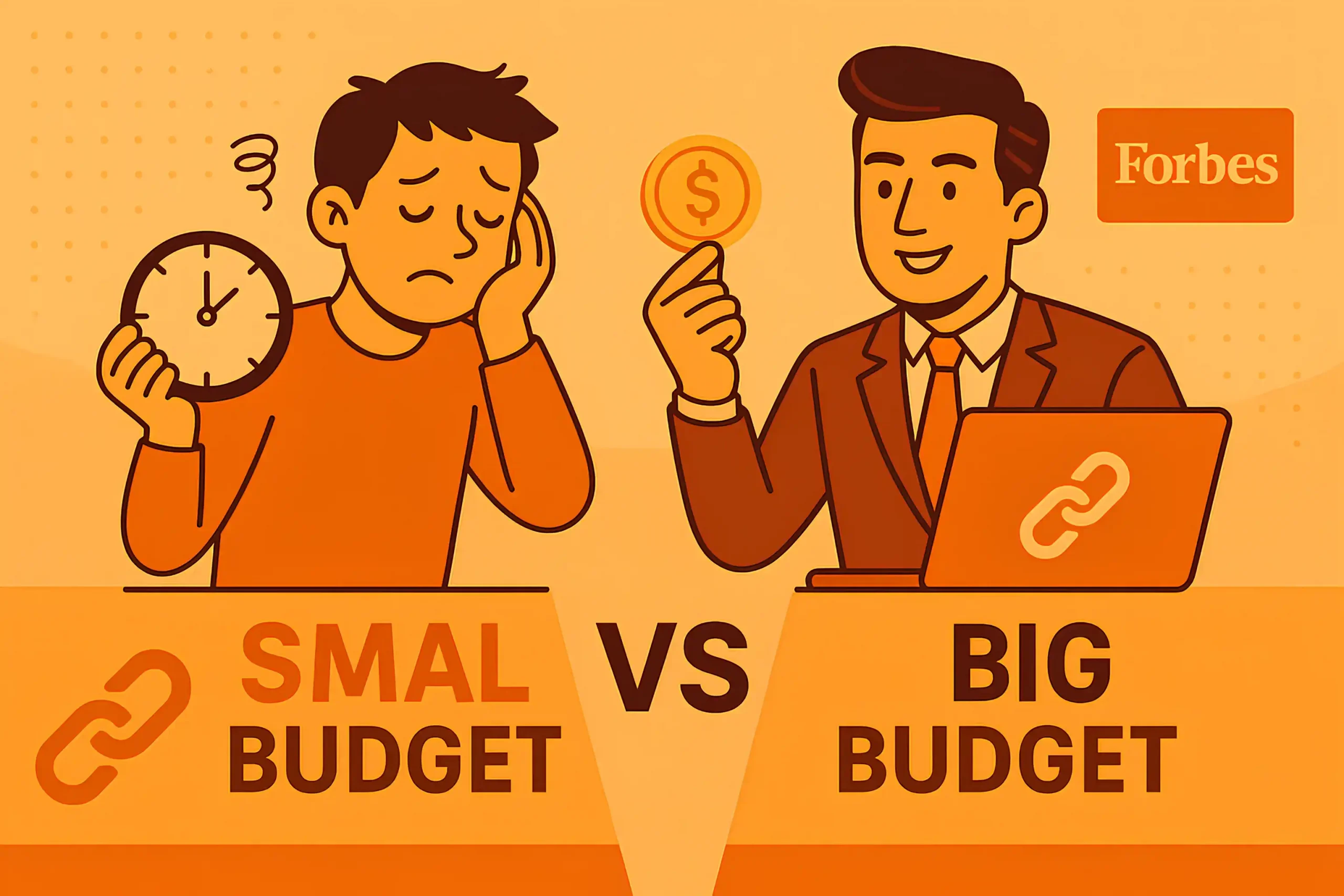Updated August 5, 2025
SEO Costs Breakdown: The Complete Guide for 2025
I’ve been in the SEO field for more than six years. During this period, I’ve seen more than enough: agencies promising guaranteed SEO results with upfront costs, freelancers trying to manipulate search engines with black-hat cheap SEO techniques, and SEO consultants charging fortunes without even being familiar with the basics.
Whether you’re a small business owner, a startup, or an enterprise company, falling into similar traps is easier than you imagine. That’s why in this guide, I’m going to talk about what affects SEO cost, different pricing models, hidden expenses, and how to budget smartly without wasting your money.
By the end, you’ll have a clearer picture of what SEO really costs and what’s worth paying for. Let’s get started.
✔️ 70% of businesses spend between $1,000 and $5,000/month on SEO services.
✔️ 68% of online experiences begin with a search engine, making SEO one of the highest-ROI marketing channels.
✔️ Businesses that invest over $2,500/month in SEO are 53% more likely to report strong ROI.
✔️ 53.5% of SEO professionals charge a monthly retainer, with project-based pricing being the second most common.
✔️ The average monthly SEO retainer is $2,819, but top agencies often charge $5,000–$10,000+.
✔️ Enterprise SEO campaigns can cost $5,000 to $25,000+ per month, depending on scale and competition.
✔️ Project-based SEO work commonly falls between $2,500 and $10,000, based on scope and duration.
✔️ Businesses that invest less than $500/month in SEO are 75% more likely to be dissatisfied with their results.
How Much Does SEO Cost?
SEO costs can range from $500 to $5,000+ per month depending on the scope, goals, and provider. The average cost of SEO depends on the type of provider, scope of services, and business goals, but here’s a breakdown of typical pricing in 2025: Below is the full breakdown.
Type of Business: Average Monthly Cost
On average, small businesses invest $500–$2,000/month in SEO, midsize companies spend $2,000–$5,000, and enterprise-level SEO costs $5,000–$25,000 or more per month.
How Much Do Companies Pay Per Month?
Most companies pay between $1,000 and $5,000 per month for SEO, with the majority falling in the $2,500 to $5,000 range.
Hourly SEO Rates: Freelancers Vs. Agencies
Hourly SEO rates typically range from $50 to $150 for freelancers and $100 to $300 for agencies, with higher rates often covering strategy, audits, and consulting.
SEO Pricing by Business Size
Larger businesses have higher SEO costs because their websites are more complex, they target more competitive keywords, and they require broader strategies, including technical SEO, content at scale, link-building, and international or multi-location SEO. They also expect deeper reporting, faster results, and dedicated experts, all of which demand more time, tools, and resources.
| Business Size | SEO Cost (Hourly) | SEO Cost (Monthly) | SEO Cost (Project) |
|---|---|---|---|
| Small Business | $50 – $100 | $500 – $2,000 | $1,000 – $5,000 |
| Midsize Company | $75 – $150 | $2,000 – $5,000 | $5,000 – $10,000 |
| Large Business | $100 – $200 | $5,000 – $10,000 | $10,000 – $25,000 |
| Enterprise | $150 – $300+ | $5,000 – $25,000+ | $60,000 – $250,000+ |
In-House Vs. Outsourced SEO Cost
When companies ask me whether it’s more cost-effective to keep SEO in-house or outsource it, I never give a generic answer because there isn’t one. What I do instead is explain what they’re signing up for, both financially and operationally.
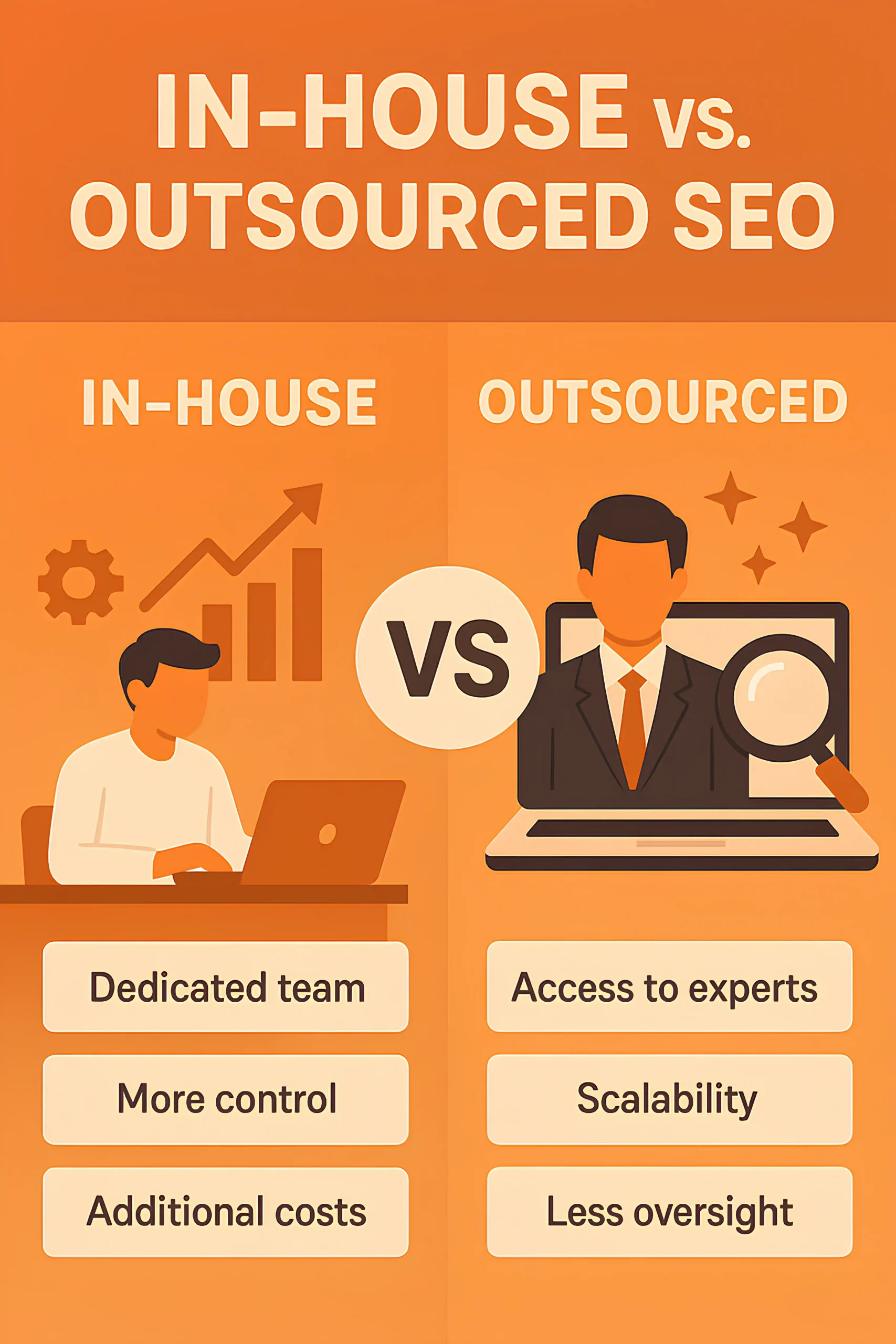
A mid-level SEO hire in the U.S. costs anywhere from $65K to $85K per year, before benefits, software, training, and the inevitable learning curve if your niche is complicated. Want a senior? You’re now looking at $100K+. And even then, one person can’t do everything.
Now, if you outsource SEO to an agency or consultant, yes, you pay monthly. Maybe $2K or $10K, depending on the scale. However, what you’re paying for is a fully built team with proven systems, tools already in place, and experience across multiple industries.
That said, outsourcing SEO doesn’t always mean better. There are agencies out there selling the idea of SEO but delivering nothing: blurry reports, no real ranking movement, recycled strategies. So if you’re outsourcing, you need to vet like your budget depends on it.
SEO Costs Around the World (Global Comparison)
There’s no universal standard, and frankly, that’s one of the biggest challenges businesses face. SEO costs vary dramatically based on geography, market saturation, average income levels, and the overall maturity of digital marketing in a region. I’ve worked with clients from the U.S. to Southeast Asia, and if there’s one thing I’ve learned, it’s that context changes everything.
| Country | Avg. Hourly Rate (USD) | Avg. Monthly Retainer | Typical Client Type |
|---|---|---|---|
| USA | $100–$300 | $2,500–$10,000+ | Mid to Enterprise |
| UK | $80–$200 | $2,000–$8,000 | Mid-size Businesses |
| India | $15–$50 | $500–$2,000 | Startups & SMBs |
| Australia | $80–$150 | $2,000–$7,000 | SMBs to Mid-size |
| Canada | $80–$200 | $2,000–$8,000 | Mid-size Businesses |
| Philippines | $10–$30 | $300–$1,200 | Startups |
Now, here’s what a lot of people don’t say out loud: some agencies in high-cost countries outsource the bulk of their work to lower-cost countries. That’s not necessarily a bad thing, but transparency matters. You should know who’s working on your site and whether you’re paying premium rates for offshore labor without even realizing it. This is especially important when reviewing white label SEO pricing; you must be sure the value matches the actual work being delivered.
So, when people ask me, “Why is SEO so expensive in my country but dirt cheap somewhere else?” I tell them this: the price is only part of the equation. What you’re paying for is a mix of local knowledge, execution quality, communication style, and long-term alignment.
Growth of SEO Service Costs (2020–2025)
Why SEO is an Investment, Not a Cost?
Too many people still see SEO as just another line item on the expense sheet. They treat it like a service they’re paying for, month to month, hoping it’ll “do something.” However, SEO isn’t a cost, it’s one of the smartest investments you can make in your business’s long-term growth. If you’ve ever relied solely on ads, you already know why.
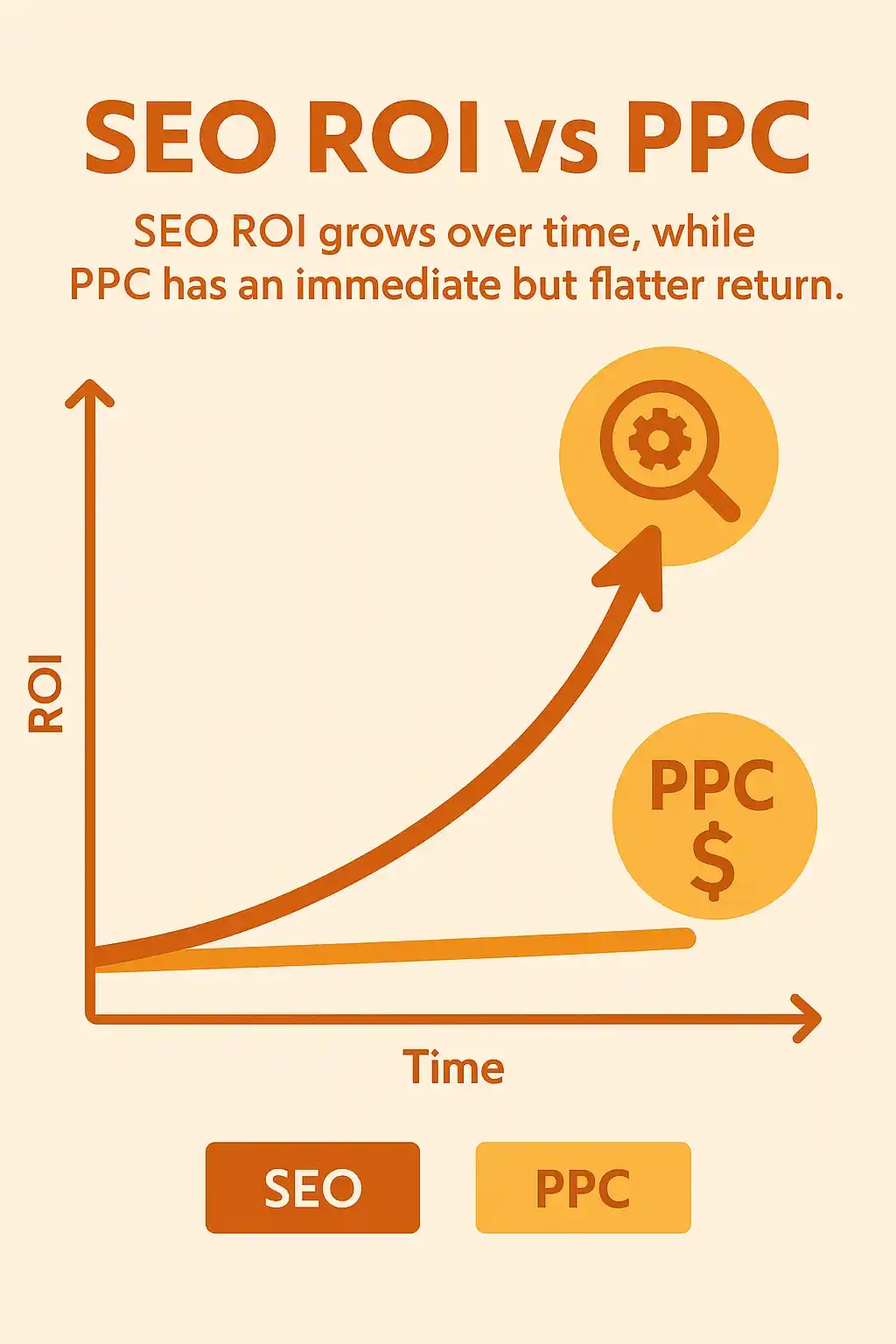
Unlike paid ads, where your traffic disappears the moment your budget dries up, the results of SEO stick around. Rankings don’t disappear overnight. A blog post that hit the front page last month can still generate leads a year from now, without you paying a single cent beyond what it cost to publish. The return continues to stack. You don’t keep paying for each click. You earn it.
That’s the beauty of compounding. SEO rewards patience. You might not see an explosion of traffic in the first 30 days, but give it time, and it snowballs. Your content starts ranking for more keywords. Your backlink profile strengthens. Your domain becomes trusted. Suddenly, you’re everywhere your audience is searching, and you didn’t pay per click to be there.
It’s also the foundation of your entire digital marketing strategy. Every channel: email, social media, PPC, relies on the strength of your website. SEO makes sure the traffic you attract can convert. It’s what gives your online presence depth, authority, and staying power.
Still, there’s a weird myth floating around that SEO is “free.” It’s not. Yes, you’re not paying Google to rank. But quality SEO takes skill, research, writing, and technical work. None of that’s free if you value your time, or your team’s. What makes SEO different is that you’re not just renting space online; you’re owning it.
So when someone asks if SEO is worth it, I don’t hesitate. If you want your business to grow tomorrow, next year, and five years from now, you should invest in SEO today.
Major Factors That Influence SEO Costs
People love to ask, “How much does SEO cost?” The real question should be: “What’s influencing the price in the first place? If you’re paying too little, you’re likely getting scraps. If you’re paying a lot, there better be a reason. So, before you invest a dime, know what’s driving the numbers.
Your Industry and Competition
The industry you’re in and the level of competition within it have a direct and often dramatic effect on how much SEO is going to cost you. If you’re in a competitive space, like law or finance SEO, it’s going to cost more because your competitors have been doing SEO for years.
They already have strong websites, hundreds of backlinks, expert content, and a lot of authority. So ranking in Google means doing more than just writing a few blogs; you’ll need a serious strategy, great content, and strong links. That takes time and money.
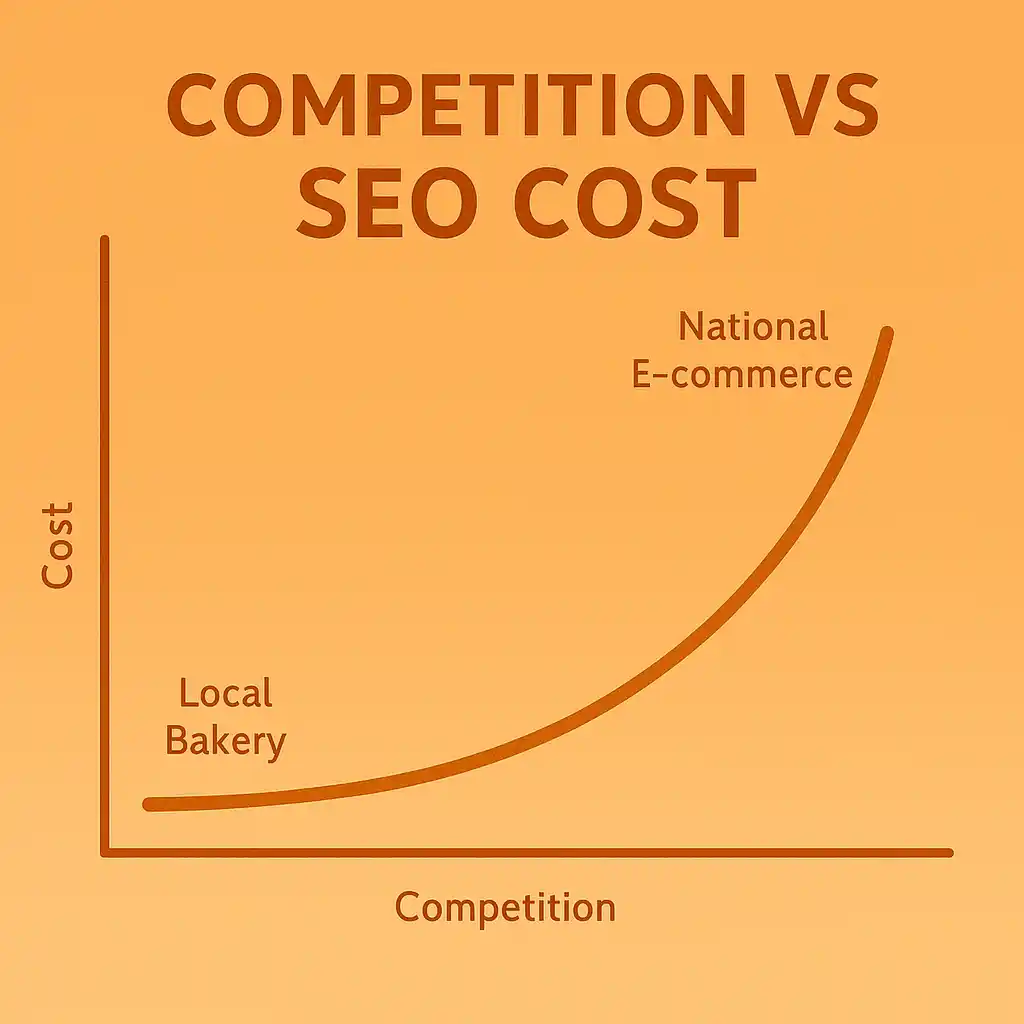
On the other hand, if you’re in a very specific niche, something like a company that makes parts for one type of machine, there might not be many competitors. That sounds easier, but it comes with its problems. There might not be a lot of keywords to target or topics to write about. You can’t post 20 blogs a month because there’s not enough to say. So, SEO here is slower, cheaper, and more focused. You just need someone who knows how to get the most out of every small opportunity.
Here’s an industry-specific breakdown of average monthly SEO investments, based on available market data, agency experience, and typical competition levels:
I’ve also been doing SEO for cannabis, vaping, crypto, and other grey niches, and believe me, the costs are way higher than in general niches. Getting backlinks in these industries is really hard. Many websites won’t link to you at all. The ones that do are charging a lot. We’re talking hundreds of dollars for one link, sometimes more.
Not because the links are amazing, but because they’re rare. These sites know you’re limited, so they charge more.
If you’re in the YMYL niches, you might find yourself investing double, like if you’re doing SEO for a dental clinic, something in health, law, or anything tied to people’s money or well-being. Google’s super strict with this stuff. You can’t just hire random writers or grab spammy backlinks. You need experts, real ones.
Nurses, doctors, and certified professionals. These writers charge more, sometimes a lot more, because they know what they’re doing and they put their name behind the content.
So yeah, your industry and how tough your competitors are make a huge difference. Some niches are easier, some are super hard, and others are expensive just because of the rules or the lack of options.
Website Size and Complexity
I’ve worked with everything, from tiny 5-page websites to massive eCommerce stores with over 10,000 pages, and one thing’s for sure: the bigger and more complex your website is, the more moving parts there are.
For example, optimizing a 15-page site for a law firm could be done efficiently in a few weeks. The scope is tight, technical errors are minimal, and you can move fast.
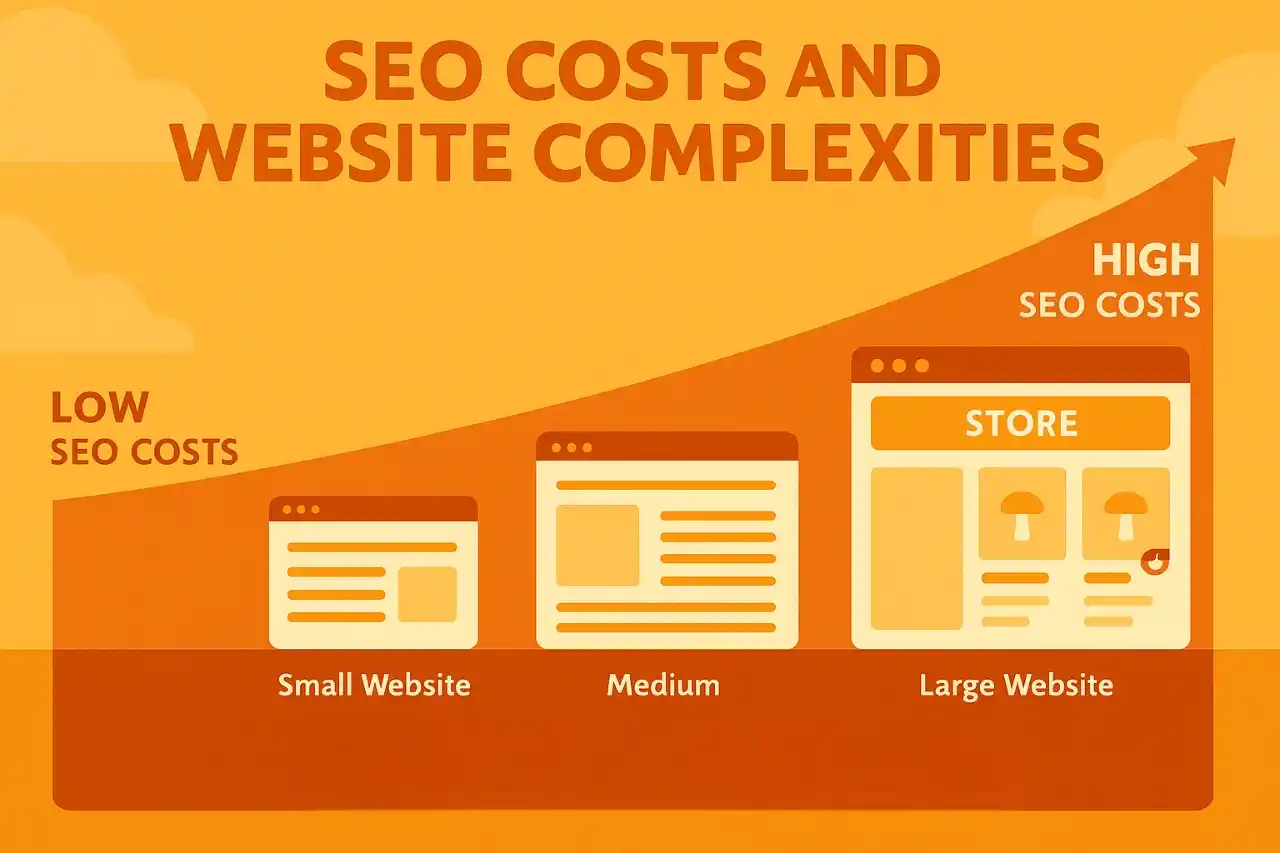
On the other side, if I’m working with an online retailer with thousands of product pages, each one dynamically generated and filled with duplicate descriptions from manufacturers, I know I’m walking into months of technical SEO, content rewriting, and structured data work, just to get the basics right.
Cost-wise? For smaller sites, you might get away with $500 to $2,000 per month and still make solid progress. But for the big guys? It’s not unusual to see $5,000 to $20,000+ per month spent just to keep things running efficiently.
Current SEO Health of the Website
Before anyone talks numbers in SEO, the very first thing I always look at, without exception, is the current state of the website. It’s the foundation, and I can tell you right now, the healthier the foundation, the lower the costs to get things moving. But if the website is in rough shape, expect the strategy, timeline, and cost to look very different.
When I say “SEO health,” I’m not just referring to how fast the site loads or if it’s mobile-friendly. I’m talking about a full spectrum diagnosis: technical integrity, backlink profile, on-page structure, internal linking, indexation issues, outdated content, orphan pages, cannibalization, broken assets, and more. If you think of your site as a car, SEO health is like checking under the hood, the engine, the wiring, and the tires before you even think about going on a road trip.
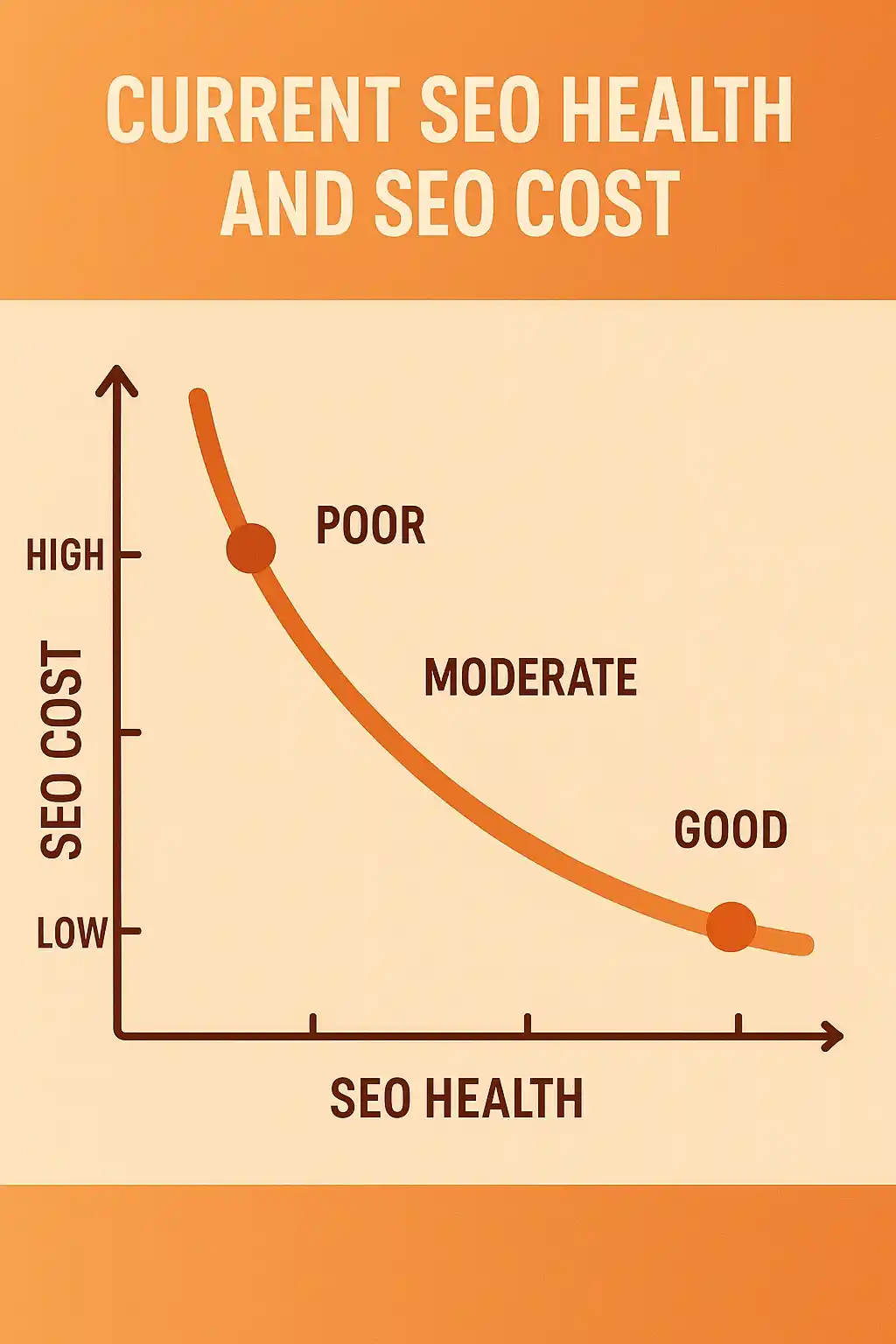
Now, let me give you two real scenarios.
Scenario one: A client comes in with a clean, technically sound site, fast Core Web Vitals, great architecture, and some decent backlinks already in place. In this case, I’m not starting from scratch. I might charge anywhere between $1,500–$2,000/month because the road ahead is more about refining, optimizing, and scaling, less about cleaning up a mess.
Scenario two: Another client has a site that’s been hit by three different SEO “experts” over the years, each layering on contradictory plugins, over-optimized pages, spammy backlinks, and a sitemap that reads like a junk drawer. Now, we’re talking about a full technical audit, backlink disavows, content rewrites, and even possible URL restructuring. That might be closer to $4,000–$5,000/month, especially during the first few months.
There’s also the trust factor. When I see a clean site, I know we can hit milestones faster. When I see red flags, like thin content ranking for nothing, links from low-quality directories, or duplicate meta everywhere, I know we’ll spend months just getting to neutral before growth even begins.
Scope of Services Needed
The scope of services is one of the biggest, if not the biggest, determinants of how much you’ll ultimately pay for SEO. I say that with full confidence because I’ve seen companies blow thousands every month with nothing to show for it, simply because they didn’t understand what they were really paying for.
When someone says “I need SEO,” that could mean ten different things. Are we talking about just optimizing a few meta tags and fixing some broken links? Or do you need a full-blown SEO campaign that includes technical audits, backlink acquisition, content production, CRO testing, and analytics reporting? The gap between the two is massive, and so is the cost.
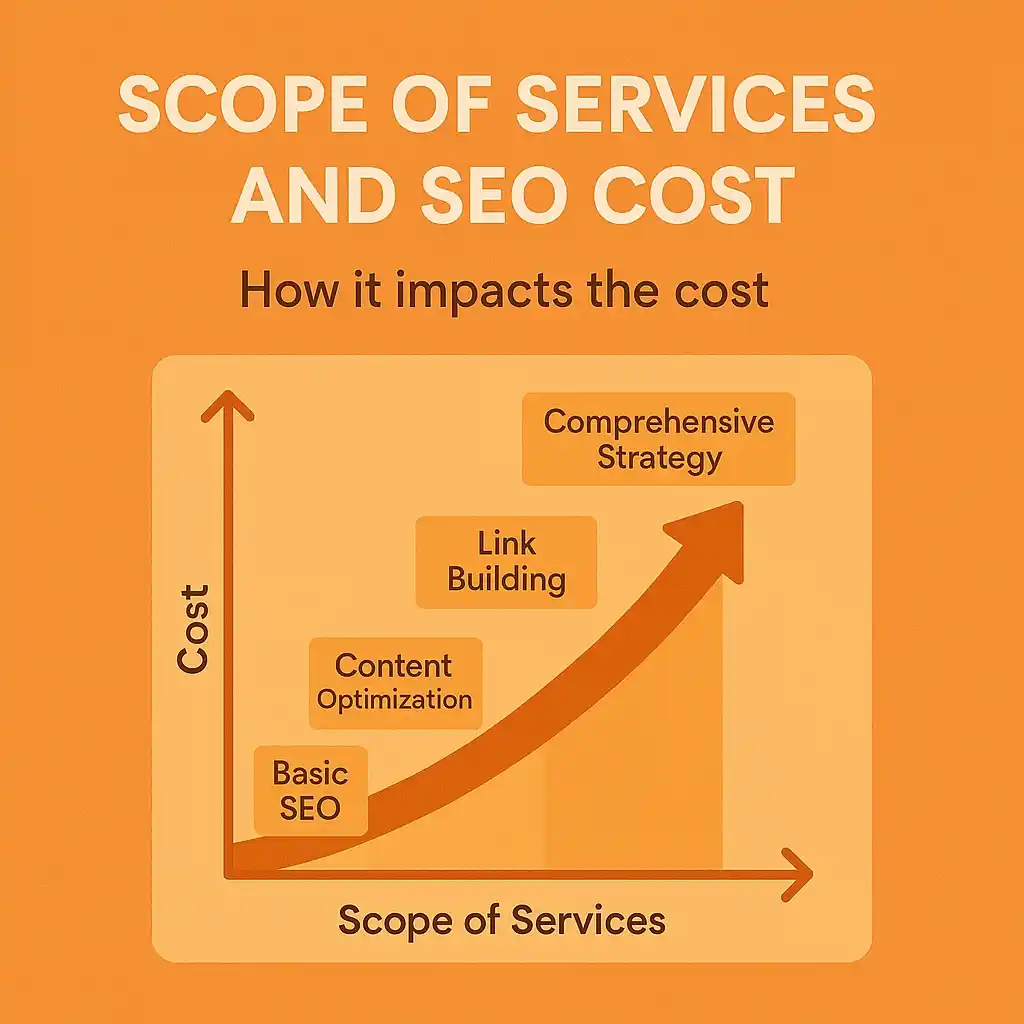
There’s also the matter of whether you’re starting from scratch or optimizing an existing site. I’ve worked with clients who had to rebuild everything, from URL structure to internal links to rewriting 100+ blog posts. In those cases, the scope grows fast, and so does the price tag.
One client had an initial SEO estimate of $3K/month, but once we realized their entire blog was cannibalizing itself, the real cost shot up to over $8K just to clean up the mess before real growth could begin.
What’s often overlooked is how interconnected all services are. You can’t just buy a backlink package and expect magic if your technical SEO is broken. You can’t expect content to rank if there’s no keyword strategy, and you definitely won’t scale if your CRO is terrible.
So when estimating SEO costs, always start by defining the exact services you need, not what some sales pitch says you should want.
SEO Pricing Models Explained
One of the first things you need to wrap your head around is how pricing models work. It’s the foundation of how agencies, freelancers, and SEO consultants structure what they charge. Some models sound appealing on paper but come with limitations that most clients don’t realize until much later.
I’ve worked with businesses of every size, and I’ve seen how the wrong pricing structure can burn through a budget without delivering meaningful results. In this section, I break down each model, its pros, hidden catches, and who it works best for.
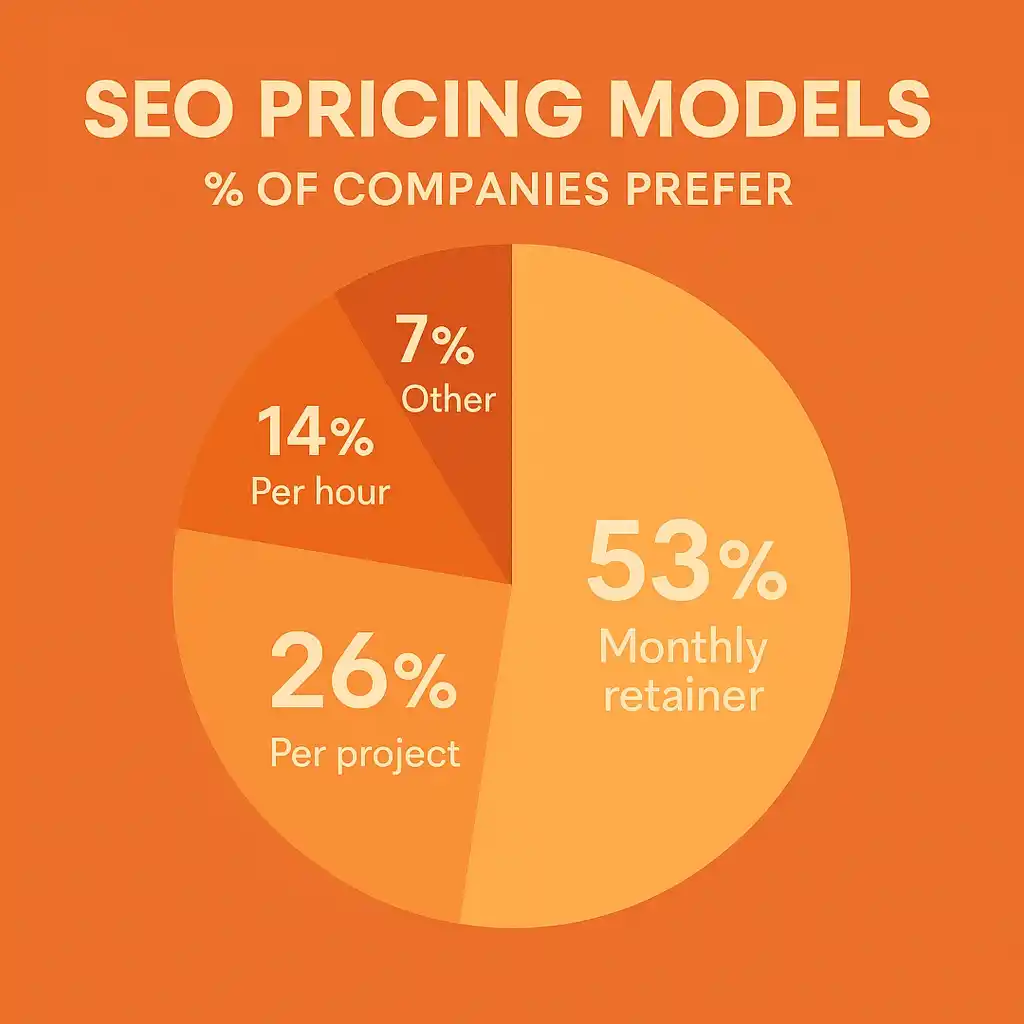
Monthly Retainers
Monthly SEO retainers are by far the most common model, and for good reason. They offer ongoing, long-term value, which is exactly what SEO needs to thrive. You’ll see a huge range.
Entry-level retainers for small businesses might start around $500 to $1,000 per month. Mid-range packages, where you start getting real strategy, better content, and link-building, usually land between $2,000 to $5,000.
Then there’s the high end, $10,000 per month and up. At that tier, you’re usually looking at enterprise-level support, full content teams, technical specialists, link-building units, CRO consultants, and dedicated account managers all in sync.
- Predictable monthly costs
- Easier performance tracking
- Flexibility for evolving needs
- Not ideal for small one-time projects
Hourly SEO Consulting
Hourly SEO consulting is exactly what it sounds like: you pay for expert advice by the hour. In this case, you’re buying judgment, experience, and the kind of insight that can save your business months of trial and error. I’ve worked with clients who only needed a few focused sessions to unlock roadblocks they’d been stuck with for over a year.
Typical hourly rates fall anywhere between $75 to $300 or more, depending on who’s sitting across the Zoom call. You’re not just paying for the time they spend on the call. You’re paying for the 10+ years of experience behind each answer they give.
This model works best when you already have an internal marketing or SEO team in place and just need strategic input. Maybe your team needs help diagnosing a drop in rankings, planning a site migration, or deciding whether to merge two domains.
Hourly consulting also fits when you’re testing the waters. Startups and mid-sized businesses often don’t want to commit to a long-term monthly retainer until they know what they’re dealing with. So instead of diving into a $3,000/month contract, you bring in someone experienced for a few hours to guide you.
- Pay only for the time you use
- Flexible and easy to start
- Ideal for short-term tasks
- No long-term commitment
- Costs can add up quickly
- Less focus on long-term strategy
- Not ideal for ongoing work
- Difficult to scale
Project-Based Pricing
This model was built for clear deliverables and defined timelines. I’ve worked with clients who only needed a full technical audit before launching a new website. Others wanted help during a site migration to avoid SEO disasters, or during a redesign when their team needed expert oversight to make sure they didn’t unintentionally tank their rankings.
These kinds of projects are perfect candidates for fixed pricing. You define the outcome, agree on the scope, and pay a set fee; no recurring bills, no surprises.
So, if your business is unsure whether your traffic problem is technical, content-related, or authority-based, you’re probably better off with a longer-term strategy. But if you know exactly what you need, like fixing a penalty, moving to a new CMS, or auditing your product category pages before scaling, project pricing brings predictability and focus.
- Predictable costs for clients
- Easy to budget
- Good for specific goals
- Flexible for one-off needs
- Limited ongoing support
- Less client retention
In-House SEO Costs
Hiring an in-house SEO team is a big commitment, and I mean both in terms of budget and long-term strategy. When you go this route, you’re not just paying for someone to make a few quick changes or post the occasional blog. You’re investing in a full-time professional (or a whole team) responsible for driving organic growth.
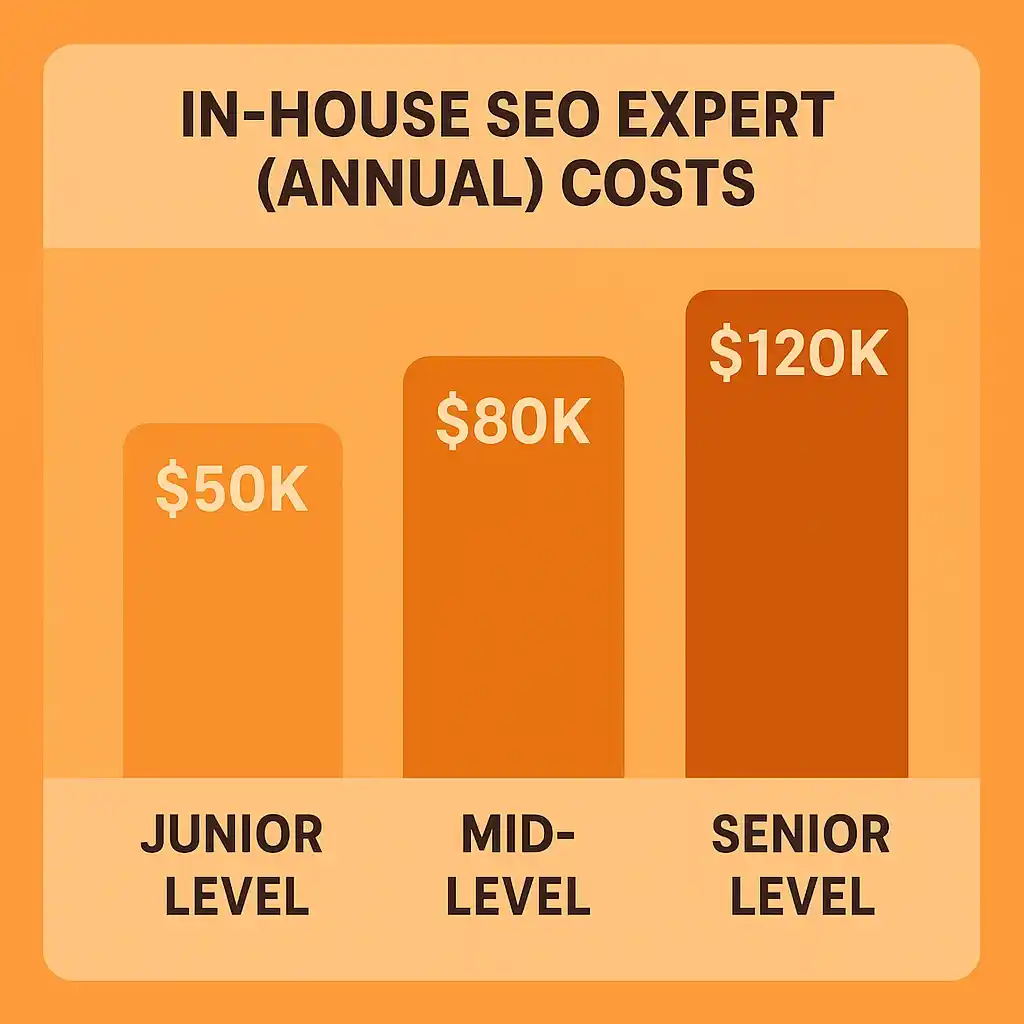
But salaries are only part of the equation. There’s also the toolkit. A serious in-house SEO needs access to software, and I’m not talking about just Google Search Console or AnswerThePublic. You’re looking at tools like Ahrefs, Semrush, Screaming Frog, Surfer, Sitebulb, Clearscope, and more. Many of these tools can run from $100 to $500+ per month each.
If you’re operating at scale, you’ll likely subscribe to multiple tools to cover everything from competitor backlink analysis to NLP-driven content optimization.
Training is another expense that companies often underestimate. SEO is one of those fields where stagnation equals regression. Conferences, courses, and certifications are necessary, not optional, and they aren’t cheap. Some companies budget $2,000 to $5,000 per person, per year, just for education.
From where I stand, in-house SEO works best when the company is committed to building a long-term organic presence and has the internal muscle to support that growth.
SEO Cost Breakdown by Service Type
Too many guides gloss over the details, but I’ve been in the trenches long enough to know exactly what you’re paying for and why it matters. From one-off audits to long-term link-building retainers, each service comes with its own cost and a reason behind it.
In this section, I will down the real costs by service type, with no unclear estimates. I’m sharing what agencies won’t always tell you, based on actual client experiences and industry-standard practices.
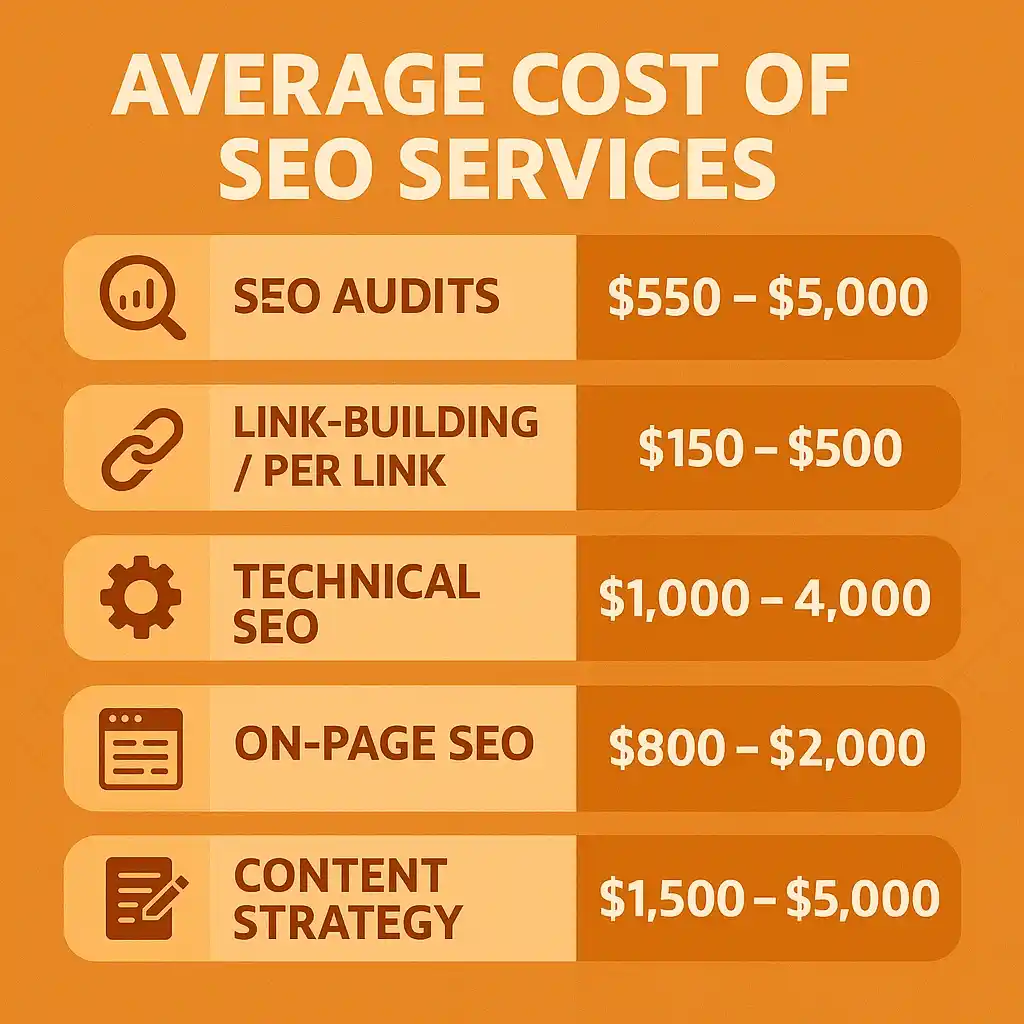
SEO Audits Cost
SEO audits costs typically range from $300 to $5,000, depending on the depth, detail, and complexity of the analysis. When someone asks me what’s included in an SEO audit, I always say, imagine it as a deep diagnostic scan of your entire SEO presence. At the lower end, around $300, you’ll typically get a basic audit.
That might include a crawl to find broken links, some meta tag feedback, and maybe a list of high-level recommendations. As the investment goes up, say into the $2,000 to $5,000+ range, things change dramatically. You’re paying for analysis, interpretation, and someone who can see the patterns most people miss.
Technical SEO Cost
No matter how good your content is or how many backlinks you have, if your technical foundation is a mess, Google’s not going to take you seriously. The cost usually reflects the depth of the work. If your site has major crawlability issues, complex architecture, or slow load times, expect to pay more.
You might get quoted $500 to $1,500 for a basic technical SEO audit. But if we’re talking about a large eCommerce store or a site with thousands of pages, you’re looking at $4000 and up, especially when ongoing monitoring is involved.
On-Page SEO Cost
Monthly retainers for on-page SEO services can range from $800 to $2,000, depending on the scale of the website and depth of optimization. Some agencies or consultants also charge on a per-page basis, anywhere from $50 to $300 per page, especially when working with smaller websites or one-off audits.
You also have to factor in scalability. Doing proper on-page SEO across 10 pages is one thing. Doing it across 300 is another story entirely. The per-page rate might drop, but the effort adds up, especially if your internal linking, structure, or content hierarchy is a mess.
Content Creation Cost
So, how much should you be paying for content in 2025? The answer depends heavily on who’s creating it and why. Freelancers come in all shapes. You’ll find generalists offering content at $0.03 per word, and then there are niche-specific experts charging $0.25 per word or more.
One delivers bulk text that might check the SEO boxes on paper, while the other writes to rank and convert. I’ve hired both. The cheap stuff usually needs rewriting or worse, harms your credibility. You don’t want a $30 blog post ruining your $300 product.
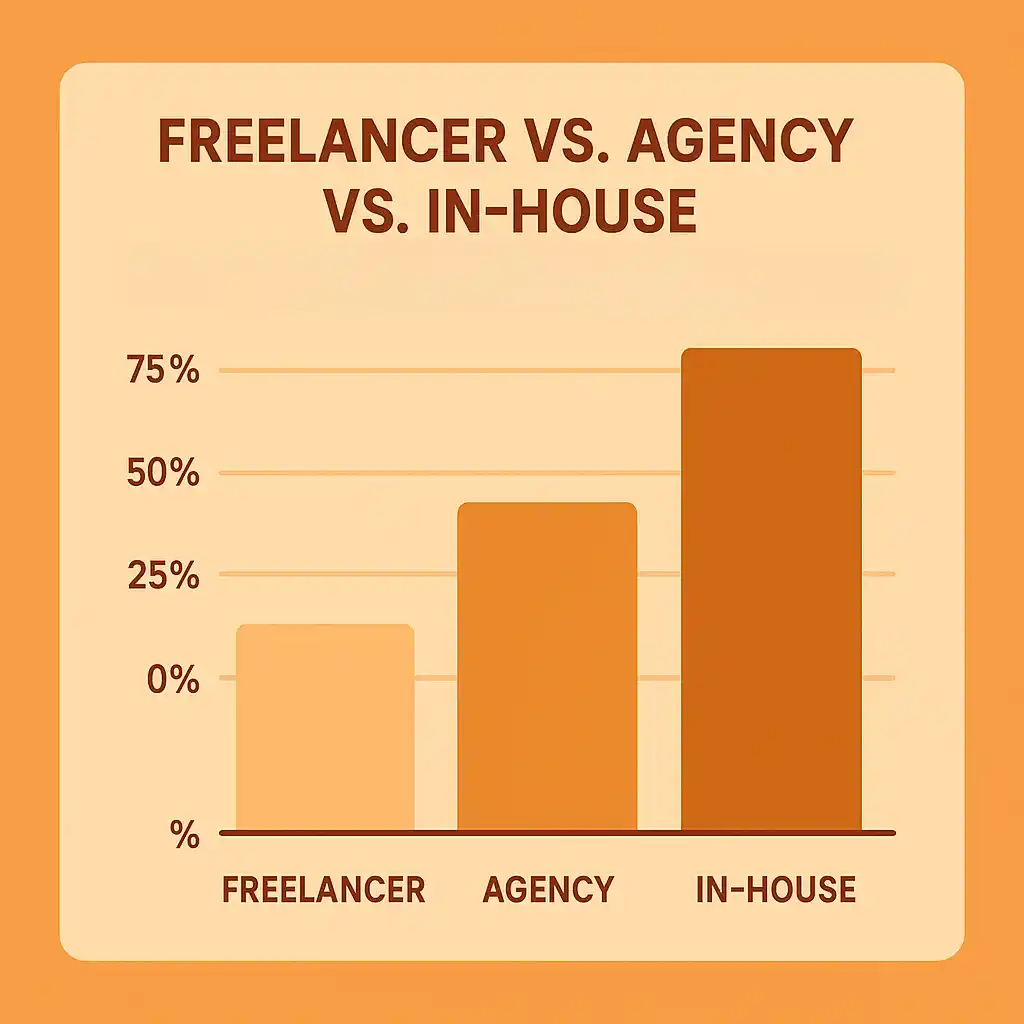
Agencies often charge higher rates, but you’re not just paying for a writer. You’re paying for editorial layers, strategy alignment, keyword research, formatting, optimization, and in some cases, a full SEO team reviewing every word. This is where the investment can start at $250 per piece and climb well into the thousands for high-impact landing pages.
In-house SEO content creation is its own challenge. Salaries, benefits, onboarding, training, and workflows come into play. A good in-house content strategist will cost you between $50,000–$80,000 annually, not counting tools or support staff. But if your business needs weekly content, technical expertise, and consistency, it may be worth every cent.
Link-Building Cost
Ah, don’t even ask me about the costs of link-building. That’s where some of my potential SEO clients disappear right after the initial call. It’s the most debated, misunderstood, and mispriced part of SEO. According to statistics, 66% of SEO professionals report that link-building consumes between 15% to 25% of their total marketing budgets.
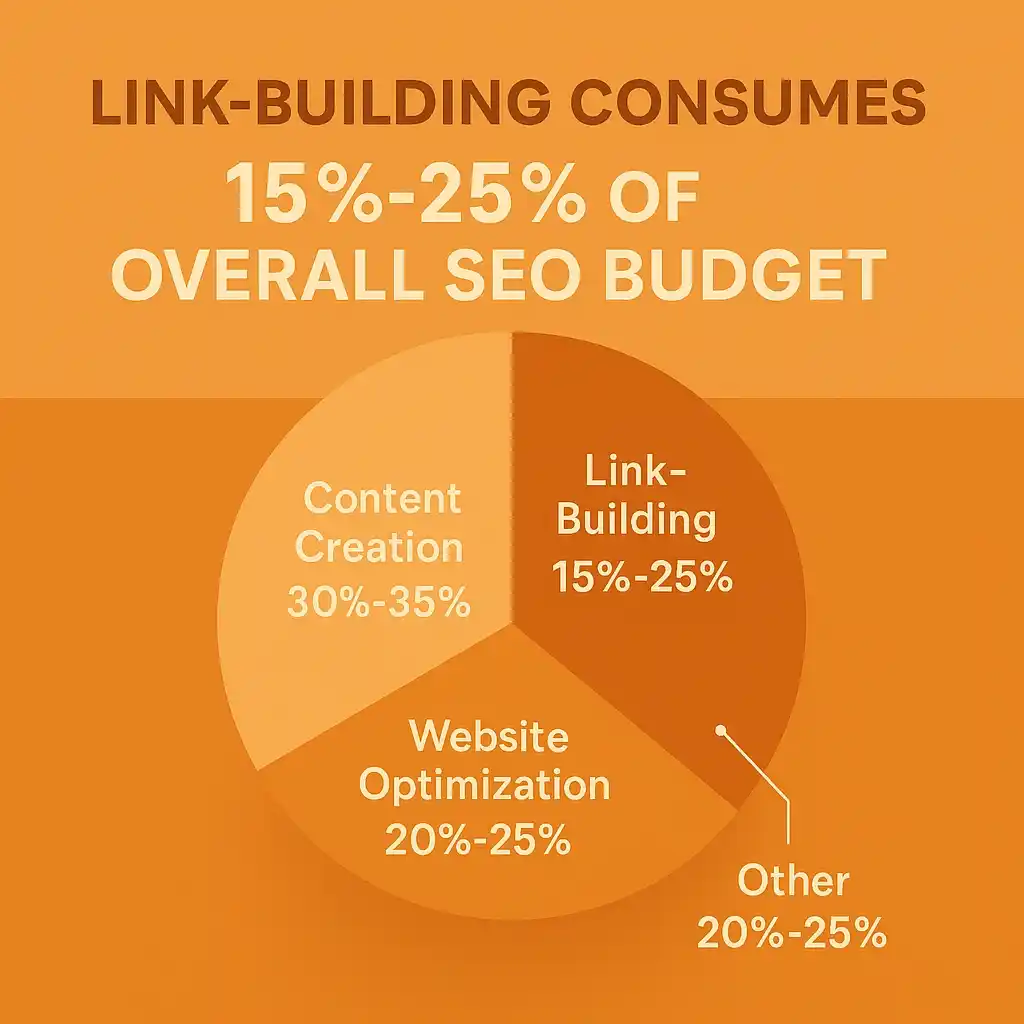
I’ve seen businesses pour five figures into campaigns only to walk away with a handful of weak links, and I’ve seen scrappy startups build organic empires by prioritizing quality over scale.
You’ll find links ranging from $100 to over $1,000 each. The variance comes down to the type of link, the source, and how it was acquired.
Here are the top link-building techniques by their average costs per link:
Now, there’s a huge gray area people don’t like to discuss publicly: Private Blog Networks (PBNs), link farms, and shady directories. They’re cheap and easy, but that price comes with a risk. If you’re paying $50 for a link and it lands you on a spun-content blog next to a casino or CBD ad, you’re not just wasting your money, you’re gambling with your domain’s reputation.
The industry also matters in this case. For example, SaaS link-building tends to be more specialized. You’re often targeting tech publications, startup blogs, or developer communities. The costs here skew higher, but the SEO ROI can be huge, because one backlink on the right platform can bring in both traffic and trust.
Local SEO Cost
Most small businesses pay anywhere between $500 to $2,000 per month for quality local SEO services. But once you step into B2B territory or you’re managing multiple service locations, you’re looking at a different ballpark entirely, $2,000 to $5,000+ monthly is more realistic for enterprise-level local SEO.
And no, I’m not just talking about spreading your NAP info across a few directories. I mean accurate, consistent, and ongoing citation monitoring and cleanup across industry-specific platforms, data aggregators, and even high-authority regional sites. Cheap tools might automate this for a few hundred bucks a year, but agencies that do it right will charge $300 to $700 per location, especially if they’re handling cleanup from years of messy listings.
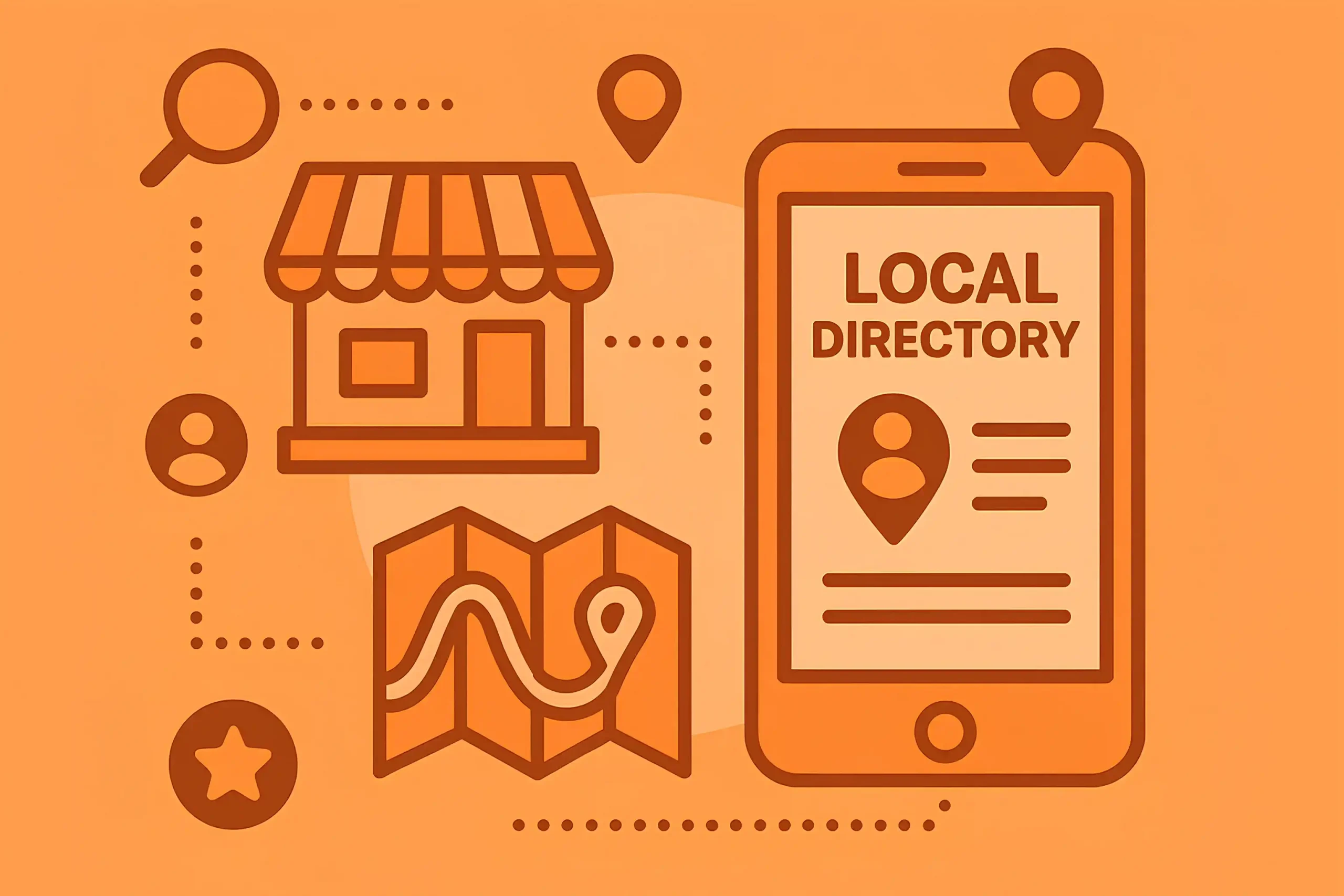
Then comes Google Business Profile (formerly GMB) optimization. This alone can determine whether you show up in the 3-pack or get buried under competitors. A proper setup includes category tuning, service descriptions, geo-tagged images, posting strategy, and Q&A management.
If you’re working with a serious SEO agency, expect to pay $300 to $1,000 upfront for the initial optimization and then $100 to $500 monthly for ongoing management, depending on your niche and how aggressive your local competition is.
eCommerce SEO Pricing
eCommerce SEO typically costs between $1,500 to $5,000 per month for ongoing services, depending on the size of the store, number of products, and competition level. One-time audits may range from $500 to $7,500. Enterprise eCommerce sites with thousands of SKUs can spend $10,000+ monthly.
A few data points to make it more interesting: Optimizing 100 product pages can cost $3,000–$4,000 alone if done manually with category-level SEO. eCommerce link-building typically costs more per link (often $250–$600+) due to niche difficulty and lower natural link attraction.
SEO Reseller Pricing
SEO reseller pricing typically ranges from $500 to $3,000+ per client, depending on the scope of work, white-label deliverables, and whether it includes link-building, content creation, or just technical/on-page SEO. Basic white-label SEO packages often start around $500–$1,000/month, covering essentials like audits, keyword research, and minimal on-page work.
More comprehensive reseller packages with monthly reporting, link-building, and blog content can go up to $2,500–$3,000+ per client. Agencies using SEO resellers typically add a 30%–100% markup when reselling services under their own brand.
Some providers also offer à la carte services, like $50–$100 per blog post, or $150–$400 per link, depending on quality.
The Cost of AI SEO Services
AI-powered SEO services typically cost anywhere from $300 to $10,000+ per month, depending on how AI is integrated into the workflow and the complexity of your website or goals. Entry-level AI SEO tools like Surfer SEO, Outranking, or NeuronWriter cost $30–$150/month for DIY optimization with AI-assisted suggestions.
Mid-tier services that combine AI with human oversight (e.g., content planning, automated audits, internal linking) usually cost $1,000–$3,000/month.

Enterprise-level AI SEO services, like programmatic SEO with auto-generated landing pages, dynamic content optimization, and predictive search modeling, can exceed $5,000–$10,000/month. Many agencies offer custom AI SEO packages that include content generation, technical audits, and large-scale data analysis, often priced based on website size and output volume.
How to Budget for SEO (Based on Business Type)
There’s no such thing as a one-size-fits-all SEO budget. What a local gym needs isn’t remotely the same as what an international SaaS brand requires. Over the years, I’ve worked with everyone from small startups to national chains, and I’ve seen how the smartest companies treat SEO as an investment with growing returns. So here’s how I approach SEO budgeting, based on the type of business you’re running.
Small Businesses and Startups
This is where I see the most hesitation: small teams, tight funds, and often a bit of confusion about what to prioritize. You don’t need a lot of budget to start, but you do need clarity. The biggest mistake I see? Spending thousands on a large agency when you’re not even sure what outcome you’re pursuing.
In early stages, I always recommend starting with the essentials: fix your technical SEO, target low-hanging fruit keywords tied to actual demand, and publish content that answers the exact questions your potential customers are searching for. Not in six months; now.
If your budget is under $1,500/month, skip the large agencies. You’ll end up with a generic campaign and little face time. Instead, hire a skilled freelancer or consultant who will treat your site like their own. If you do decide to outsource link-building or content, make sure every dollar is tied to a specific outcome, whether that’s ranking for a buyer-intent keyword or improving a key product page.
I’ve watched startups grow from 0 to 10K organic visitors/month with a simple, focused SEO plan and a single content writer who knew what they were doing. It’s not about having the biggest budget. It’s about having the cleanest plan.
B2B Companies
For B2B, SEO is a long game of trust and accuracy. If you’re a B2B brand and your website reads like a brochure, you’re wasting valuable SEO real estate. In B2B, I advise clients to invest heavily in authority-building first, because buyers aren’t impulsive; they’re cautious. They need to believe you know your stuff before they even think about filling out a form.
Budget-wise, this often means allocating more toward thought leadership content, long-form guides, and digital PR. A lot of B2B companies spend $10K/month on link-building, but barely invest in creating content that proves expertise.
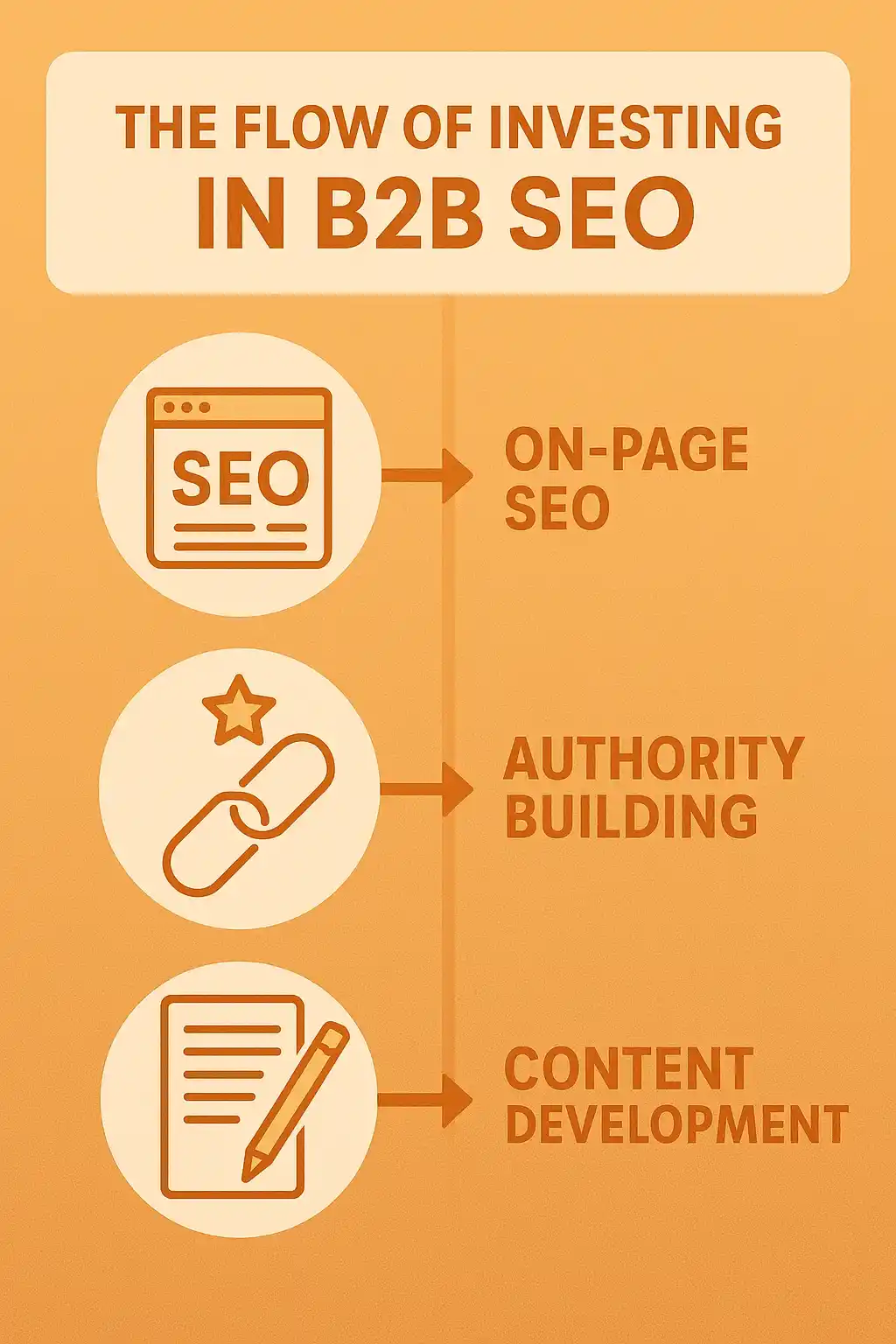
In B2B SEO, you need both. If I had to pick, I’d rather see you dominate your niche with fewer high-quality, authoritative pieces than fill your site with 100 average-written blogs.
International SEO Costs
International SEO typically costs between $2,000 to $10,000+ per month, depending on the number of target countries and languages. Each additional location or language can increase the budget by 15%–30% due to localized content, hreflang setup, and region-specific strategies.
This is where things get real complex, real fast. If your business operates across multiple countries, your SEO budget has to reflect technical and cultural accuracy. I always recommend separate strategies per country, not just translated content, but localized SEO.
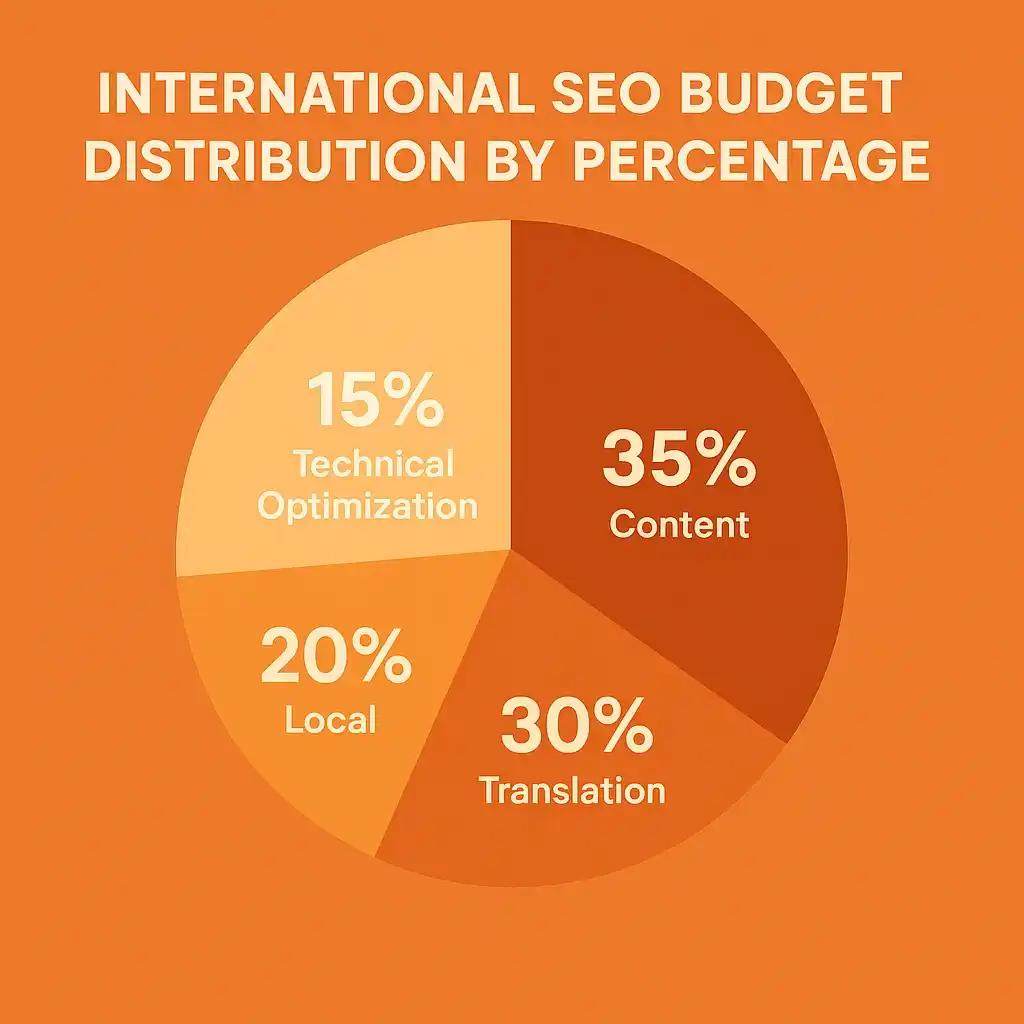
Invest in native speakers. Machine translation won’t work in most cases, and neither will blindly copying your U.S. content across to the UK or Germany. Even Google understands intent differently across languages and regions. You need unique keyword research and content localization for each target market.
National SEO Cost
If you’re targeting an entire country, whether it’s the U.S., Canada, or Australia, your SEO budget has to be structured around scale and consistency. Ranking nationally means you’re competing with everyone, so your site needs depth, authority, and sustained effort over time.
Also, budget for brand building. Google favors brands in national searches. That means digital PR, industry citations, branded content, and more. Remember, you’re not just building a website, you’re building a signal of trust across the web.
Franchise SEO (Multiple Locations)
Franchise SEO typically starts at $1,500 to $3,000 per month per location, with costs increasing by $500 to $2,000 for each additional location, depending on local competition and service scope. Each location needs separate optimization for local SEO, listings, and content, which drives up the overall budget.
Honestly, I don’t like doing SEO for multiple-location companies. But one thing’s clear: the budget has to cover local optimization at scale, meaning each location needs its own optimized page, unique content, and local backlinks.
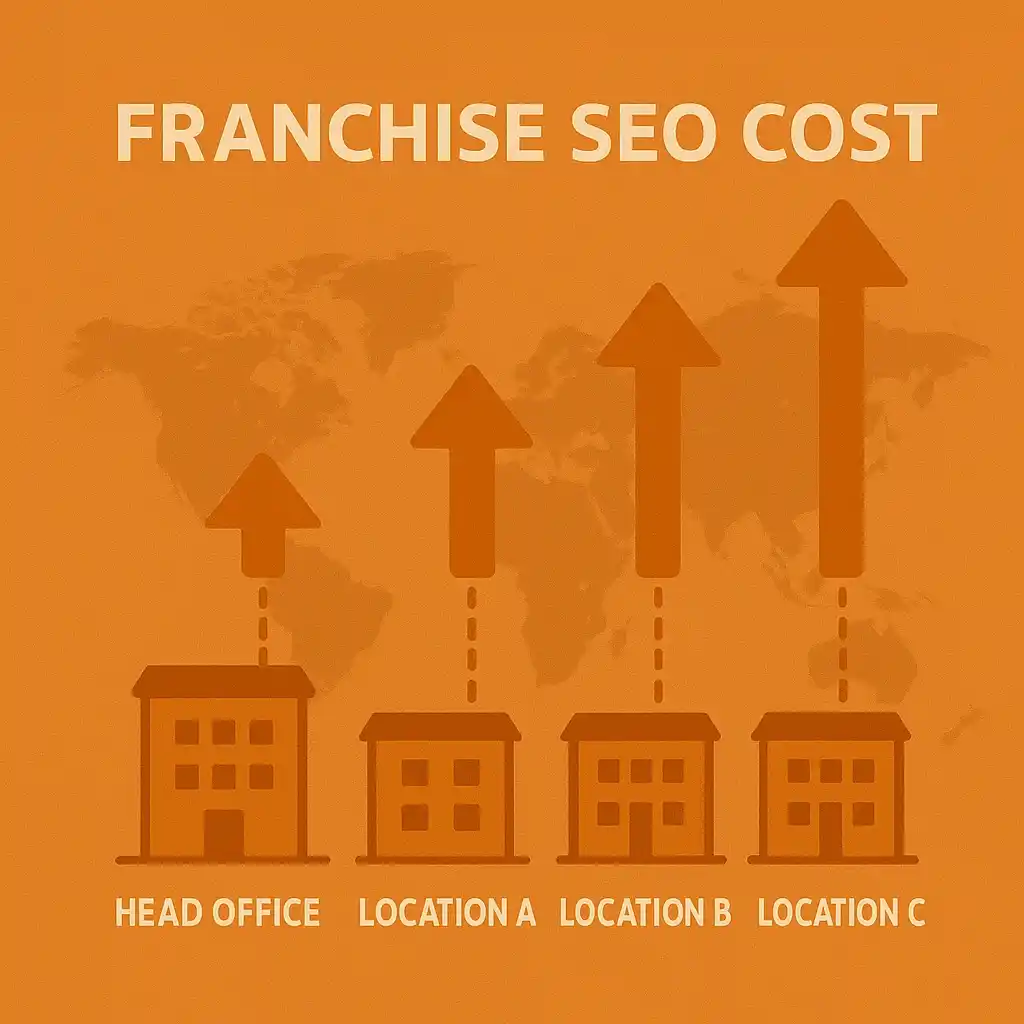
Avoid the trap of using a single city’s content across all your locations. Google’s not stupid. If you’ve got 10 identical service pages with different city names swapped out, you’re not getting far.
Also, invest in review generation, citation cleanup, and Google Business Profile optimization for every location.
Other Types of Businesses
There are always edge cases: nonprofits, personal brands, info products, and mobile apps. But the rule I always follow is this: budget according to your growth goals, not your current revenue.
If your organic traffic goal is 5K/month, you can get away with a starter plan. But if you’re trying to become a market leader, you need a budget that respects the scale of that ambition. That might mean hiring an in-house SEO manager or building an SEO content team.
Hidden SEO Costs to Consider
When people talk about SEO costs, they usually think of agency retainers, content creation, and maybe a few tools. However, those are just the obvious ones. The real strain on your budget often comes from what’s not being talked about upfront; costs that quietly consume resources, time, and energy.
One of the biggest silent budget killers is internal coordination time. If you’re working with an agency or freelancer, someone on your team has to manage the relationship. That means answering emails, reviewing deliverables, hopping on meetings, providing access, and managing approvals.
Multiply that by weeks or months, and you’re looking at dozens of work hours that no one accounted for.
There’s the cost of bad advice. I’ve seen clients come in after following cookie-cutter strategies from consultants who barely understood the business.
The damage? Wasted content, poor link-building decisions, and in some cases, algorithmic penalties that dropped traffic.
Fixing those mistakes cost them double what they originally spent.
Tool addiction is another budget waste. Teams subscribe to every unknown SEO tool thinking it’ll give them an edge.
But if you’re not actually using them to drive real decisions, they become extra expenses.
Worse, people start trusting metrics they don’t fully understand. That leads to decisions based on TF*IDF scores or “toxicity” ratings rather than actual search behavior or conversion data.
How to Choose the Right SEO Provider for Your Budget
In my opinion, if your budget is under $1,000, hiring an SEO agency might not be the best move. Most agencies can’t deliver meaningful results at that level, they’ll either outsource the work to the cheapest freelancers or give you a cookie-cutter strategy. You’re better off working with an SEO coach who can guide you, help you prioritize the right actions, and teach you how to build a strong foundation yourself. It’s slower, but it’s smarter.
If you’re a local business or operating in a low-competition niche, you don’t always need a high-end SEO agency. Affordable SEO services can still bring solid results, as long as the provider understands your market, targets the right keywords, and sets realistic goals. For many small businesses, a focused local SEO campaign is more than enough to dominate the first page.
On the other hand, if budget isn’t a concern, skip the DIY route. Hire a proven SEO agency that handles everything from strategy to execution. A good team can move fast, avoid rookie mistakes, and scale your visibility across search engines without you micromanaging the process.
SEO Cost Myths Debunked
One of the biggest challenges business owners face when exploring SEO is not the cost itself, but the misunderstanding of it. There’s a cloud of myths circulating, and I know how they create confusion, unrealistic expectations, and ultimately wasted budget. So let’s clear the air.
Myth #1: SEO is a One-Time Fix
Some people still believe you can “do SEO” once and be set for life. I don’t blame them entirely, it’s a result of outdated advice and questionable sales pitches. However, SEO is not a product, it’s a process. It evolves. Search engines change, your competitors adapt, and your content ages. If you’re not consistently optimizing, you’re falling behind. Ranking once doesn’t mean staying there.
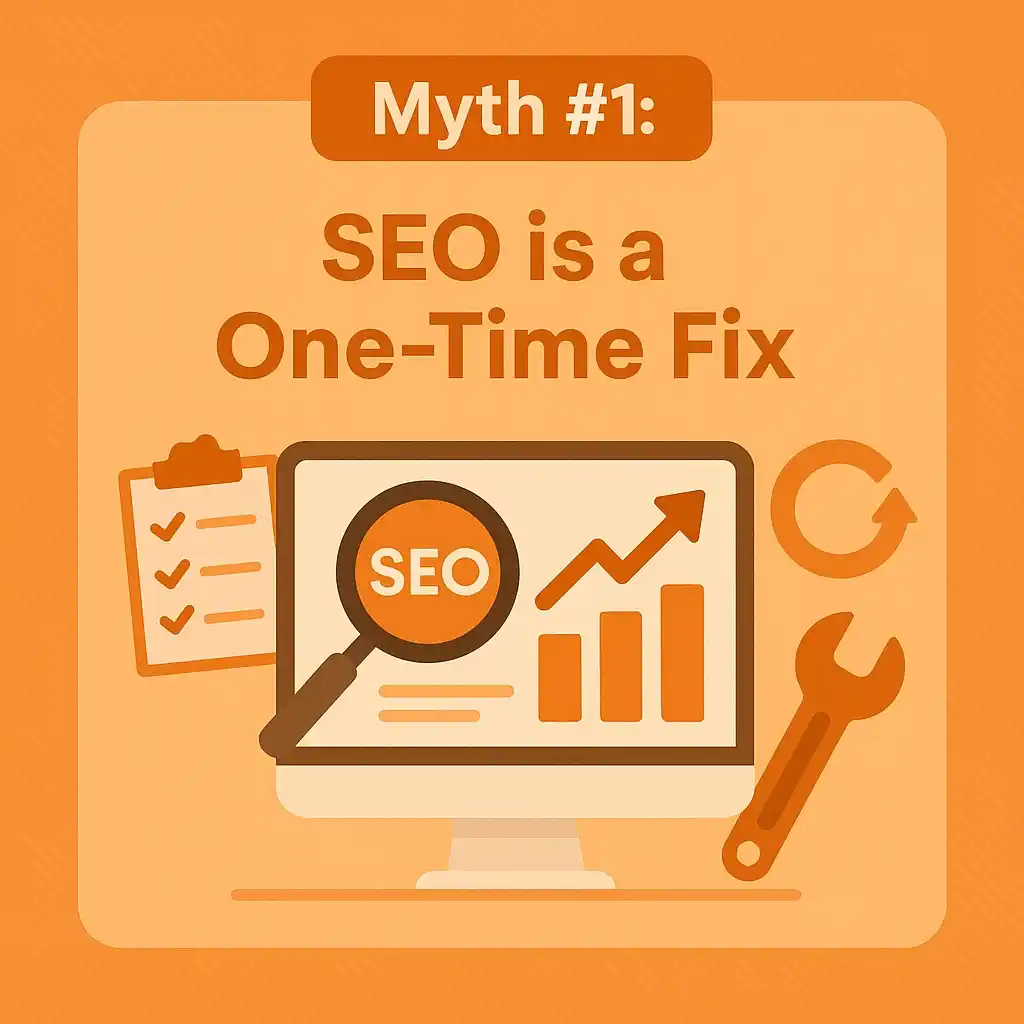
Myth #2: Higher Price Means Better SEO
Many agencies charge $10,000 a month and do less than freelancers or fractional SEO consultants charging a fifth of that. Don’t confuse expensive with effective. What matters is how the budget is used, not just the number on the invoice. You want transparency, proven results, and actual work delivered. I always advise clients to ask what’s included and what outcomes are being measured. Empty retainers are more common than you’d think.
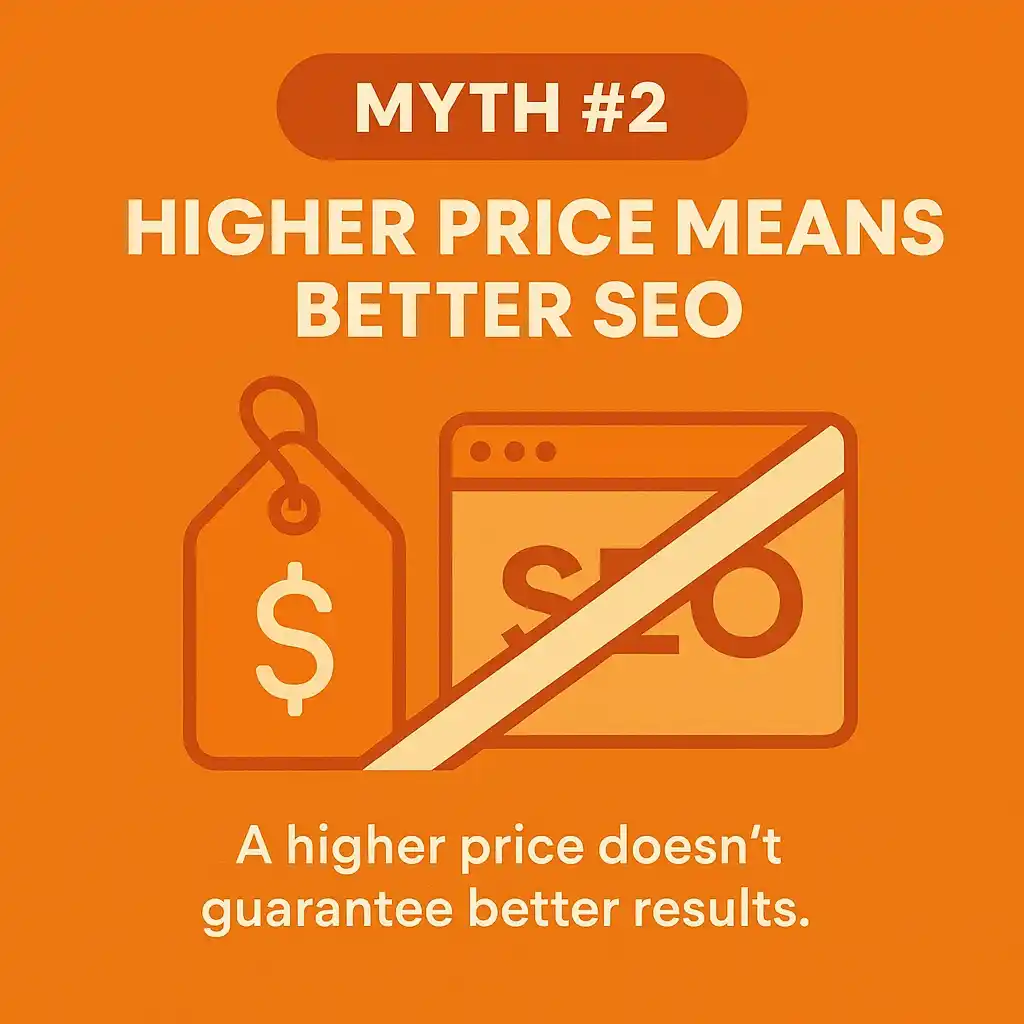
Myth #3: Cheap SEO Is “Better Than Nothing
I’ve had to clean up the mess left by bargain-bin SEO providers. Some business owners go for the cheapest quote, thinking it’s a low-risk trial. What they don’t realize is that bad SEO doesn’t just stall progress; it can get your site penalized, buried, or even deindexed. Honestly, because of small budgets, I’ve told more companies not to start SEO than to go for it. You can’t build trust with Google using spammy tactics, fake links, or copy-pasted content.
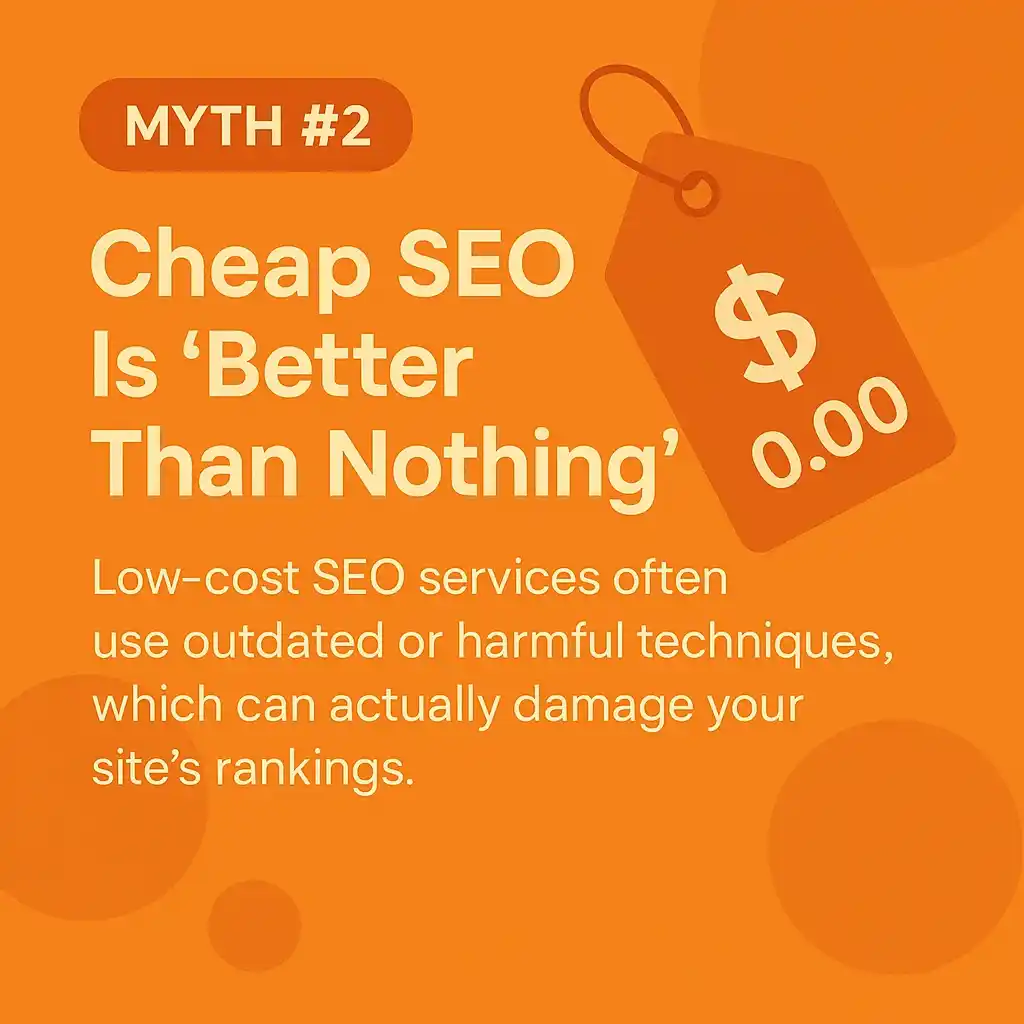
Myth #4: SEO Is Guaranteed
This is one of the most dangerous myths I’ve had to debunk. Any agency or freelancer that guarantees specific rankings, especially within a short time frame, is either overpromising or outright lying. Search engine algorithms are not something we control.
Google doesn’t hand out backstage passes. What we can do is follow best practices, make data-driven decisions, and improve your website’s authority, relevance, and user experience. But we can’t guarantee exact positions.
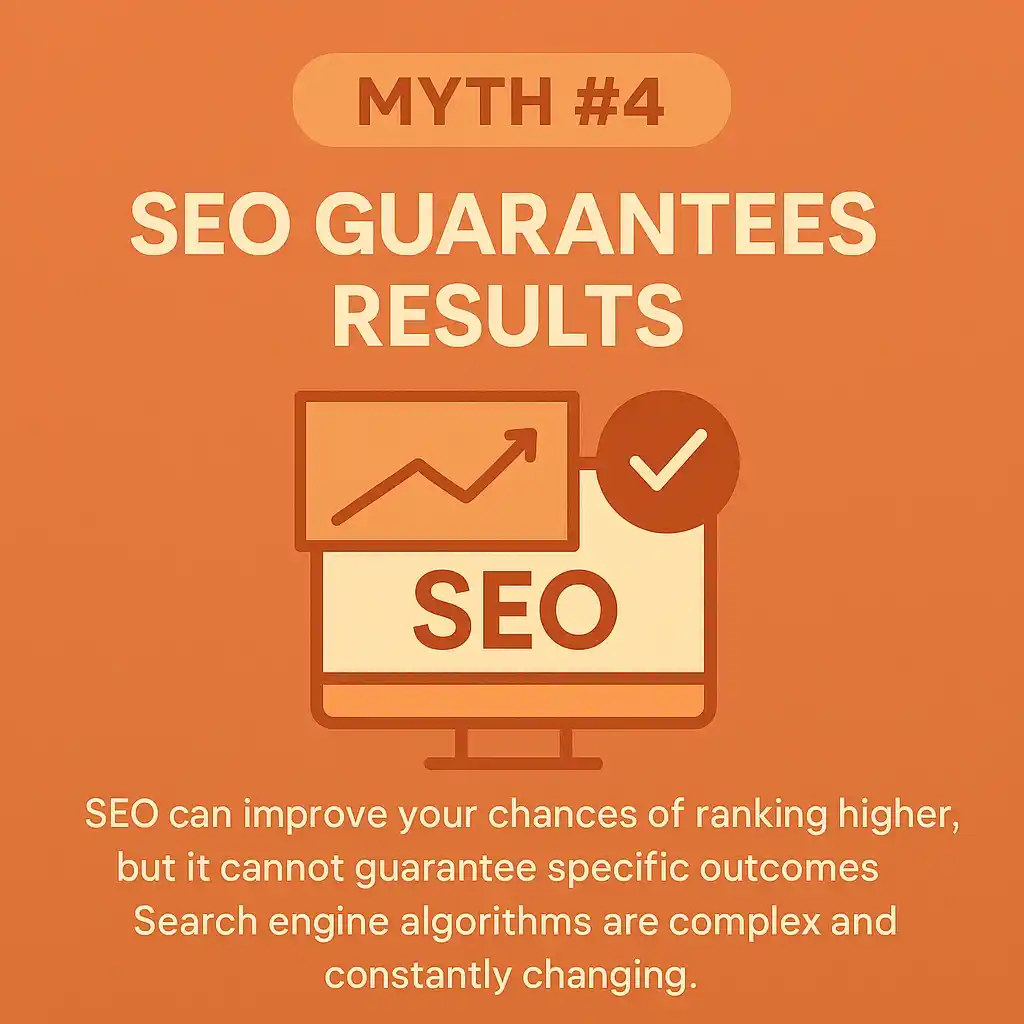
What Factors Influence Monthly SEO Pricing the Most?
Monthly SEO pricing is mainly shaped by three core components: service fees, link-building, and content creation. Service fees cover the strategist’s time, tools, planning, and ongoing execution. Link-building is where things often get expensive.
Getting high-authority backlinks requires manual outreach, personalized pitches, and trusted relationships. Content is another huge factor. This includes blog posts, landing pages, and other on-site assets.
It also depends on your current SEO health and goals, whether you’re starting from scratch or trying to outperform aggressive competitors. The more ground you need to cover, the higher the cost.
What’s Typically Excluded From SEO Service Packages?
One of the big ones is publisher costs for backlinks. If you’re working with a white label SEO provider who pitches digital PR or guest posting, the fees you’re paying them likely don’t include the cost that publishers charge to post the content.
Content writing is another grey area. Some agencies include it, but only up to a certain word count or number of articles per month. Others hand it off entirely to you.
Is Performance-Based SEO Pricing Reliable or Risky?
Performance-based SEO pricing might sound attractive; no results, no payment. But in practice, it’s often a trap dressed as a deal. Some agencies promise rankings, but won’t clarify which keywords or what position counts as success. Suddenly, you’re “ranking” for irrelevant terms with zero business value, but the agency collects the check.
I also question the long-term results. Most performance-based SEOs won’t build long-term assets like branded content, real authority backlinks, or technical foundations, because those take time and don’t guarantee instant results. They play short-term SEO games, and once you stop paying, your rankings often collapse because you never actually owned the growth.
How Do You Compare the Value Between SEO Freelancers and Agencies?
It depends on how you define “value.” A freelancer often brings focused attention, personalized communication, and a hands-on approach to your project. When you hire the right person, you’re not paying for office overhead or account managers, you’re paying directly for expertise and execution. That’s great if your budget is limited or you need flexibility.
On the other hand, a well-run agency can offer a broader skill set under one roof. However, some agencies work like conveyor belts. Your site becomes one of many. You might get templated strategies, or worse, be assigned to someone junior with limited real-world experience.
Are Cheap SEO Services Ever Worth the Risk?
Yes, if you know why they’re cheap. I know some early-stage agencies, fresh freelancers, and even some sharp teams on platforms like Upwork or Fiverr offer low-cost packages just to get social proof. They’re hungry, they want reviews, and they’re willing to go the extra mile to get results that earn them credibility. That’s not “cheap” in the careless sense, it’s strategic pricing with long-term goals in mind.
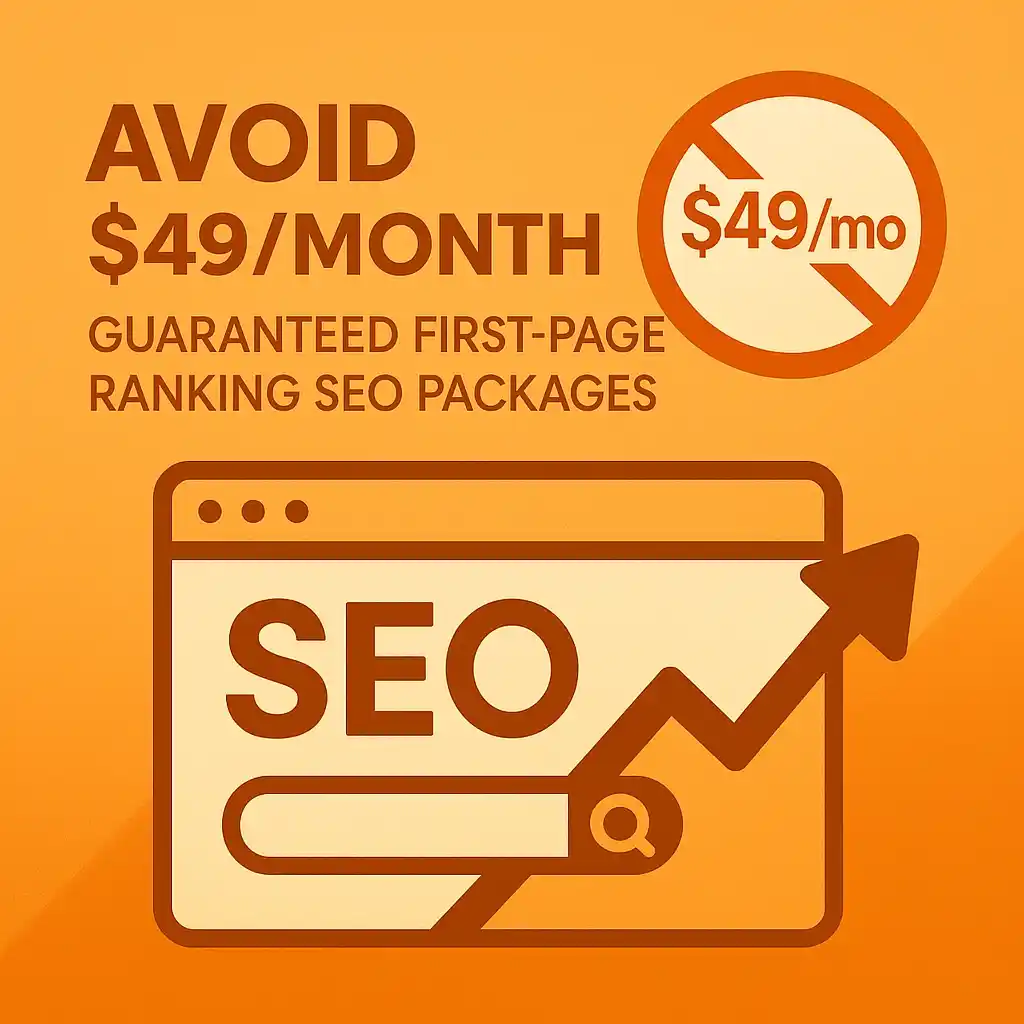
Now, that’s very different from the “$49/month, guaranteed first-page ranking” crowd. That’s the danger zone, those packages usually rely on outdated tactics, black-hat links, or automated spam.
How Can I Identify Overcharging in an SEO Proposal?
One of the first things I check is whether the proposal is filled with jargon but light on actual deliverables. If you’re paying $5,000 per month but can’t clearly identify what they’re doing week to week, that’s a red flag.
Another trick I’ve learned is to ask how many clients the person or agency is currently managing. If they’re overloaded, but still quoting premium pricing, you might just be paying for their client acquisition costs or inflated overhead, not for meaningful SEO work on your site.
Are SEO Results Guaranteed if I Pay Premium Rates?
No, and I’ll say it again, no. Even the best SEO experts don’t have control over Google’s algorithm. What you do pay for at premium rates is experience, better execution, and the kind of strategic thinking. But guaranteed rankings? That’s a red flag.
Do Higher SEO Fees Always Equal Faster Results?
Not always. Paying more might get you a better team, but it won’t necessarily get you faster results. SEO is still a process, no matter how much money you throw at it. A site with a messy backlink profile, poor internal architecture, or zero topical authority won’t suddenly become a traffic magnet just because the agency’s charging $10k a month.
What you’re paying for at a higher price point is quality of thinking, process maturity, and execution speed. But even then, timing depends on your current SEO baseline.
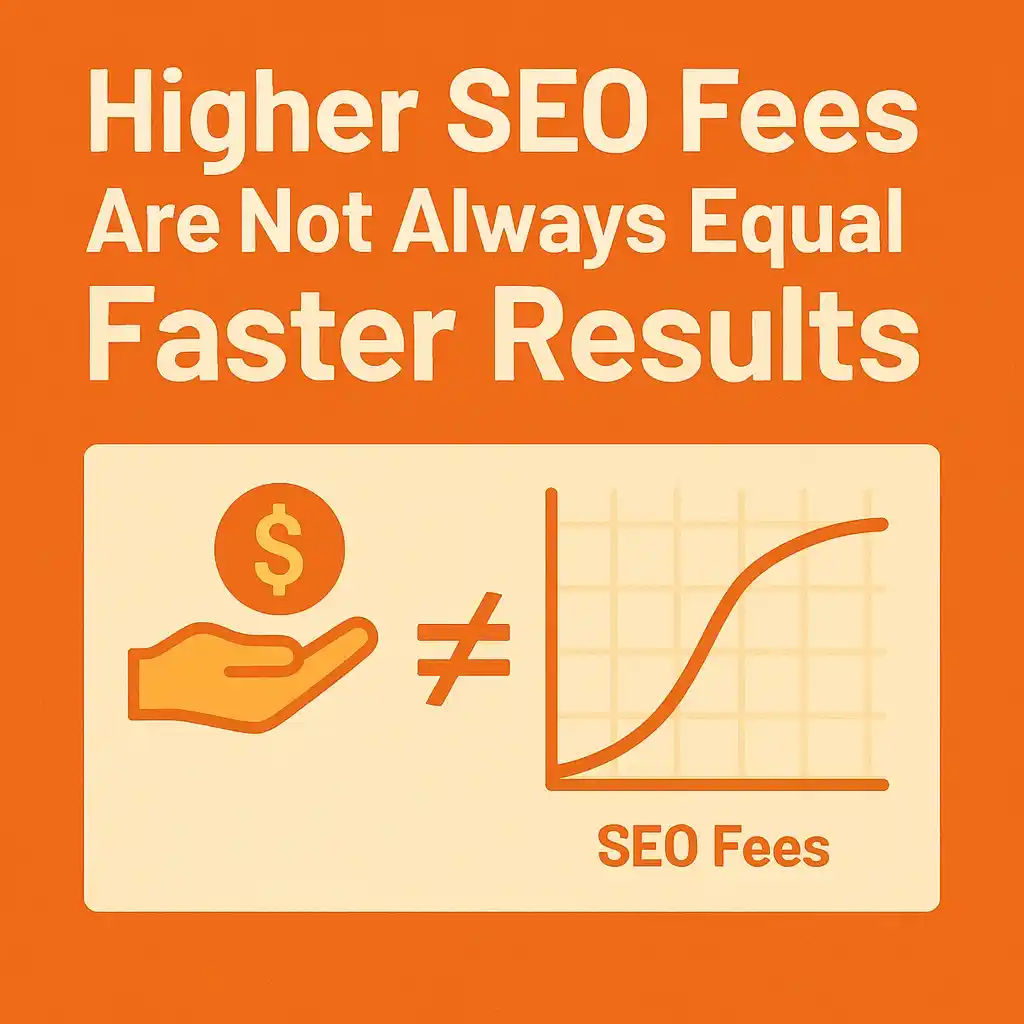
Also, don’t confuse activity with progress. A bigger SEO budget might buy you more deliverables, but if they’re not solving real ranking issues, like fixing crawl traps or improving UX, it’s just busywork. Fast results only happen when a smart strategy meets the right timing, and sometimes, patience is the cost of playing the long game.
How Do I Avoid Paying for Vanity Metrics That Don’t Drive Revenue?
Here’s the trap I see far too often: businesses get seduced by high Domain Ratings (DR) or brag about “100,000 monthly visitors” while conversions sit at zero. That’s vanity metrics that look impressive on reports but don’t move the needle where it matters: revenue.
Start by questioning the KPIs your agency tracks. If their reports highlight DA increases or traffic spikes from irrelevant geographies, push back.
Always consider qualified traffic, not inflated numbers. I care more about ranking for a buyer-intent keyword with 100 monthly searches that converts than hitting 10K visits from top-of-funnel blogs. Also, be wary of links from sites with sky-high DRs but no real organic traffic; many of them are glorified link farms.
What’s the Cost Risk of Hiring a “Jack of All Trades” Marketer for SEO?
Hiring a generalist who works in SEO is one of the biggest budget traps I see small businesses fall into. On the outside, it seems efficient; one person who can “do it all.” But in reality, SEO is not a task you add to a to-do list between email marketing and graphic design. It’s a full-time discipline with hundreds of moving parts. When someone tries to wear every hat, your SEO ends up being a checkbox.
What Do I Do if I’ve Paid for SEO and Nothing Improved?
First, take a breath. This is a common scenario, and no, it doesn’t mean SEO doesn’t work; it means something was off in the execution. It happens dozens of times, and the issue usually comes down to one of three things: zero strategy, outdated tactics, or poor communication.
Sometimes SEO doesn’t work because the work was bad. Sometimes it doesn’t work yet because it’s still early. Know the difference, and don’t throw good money after bad until you’re sure which one it is.
Is It Possible to Calculate SEO Costs Per Keyword?
It’s possible, but it’s not straightforward, and anyone who says otherwise probably hasn’t been in the SEO field for long. You can try to estimate the cost per keyword by looking at the competition, monthly search volume, and how aggressive the top-ranking sites are. But even then, it’s a moving target. One keyword might cost you thousands in content, links, and time just to make the first page. Another might take one well-written article and a few solid backlinks.
In my experience, the better question isn’t “What’s the cost per keyword?”, it’s “What’s the ROI of ranking for this keyword?” Some keywords bring traffic but zero conversions. Others have low volume but drive business. So when I plan SEO budgets for clients, I look at keyword value, not just cost.
Can I Use an SEO Cost Calculator to Estimate My Budget?
You can, but you’ll probably be wrong, and that’s not your fault. Most SEO calculators are too simplistic. They ask how many keywords you want to rank for, how competitive your industry is, and how fast you want results. Then they spit out a number. It sounds helpful, but SEO doesn’t work in neat, clean boxes.
What these tools don’t tell you is that your site’s current authority, technical foundation, past content performance, and even backlink history play a major role in your actual costs. If you really want to estimate your budget properly, do a site audit first. Then talk to someone who knows what they’re doing.
What Are the Typical Costs for Ongoing SEO Maintenance?
The cost can range anywhere from $500/month for small local sites to $1500/month or more for national and enterprise brands.
Maintenance costs should also account for things like revisiting keyword strategy, merging or deleting outdated content, and watching for changes in user behavior. True SEO maintenance is the difference between keeping your visibility or watching it decay quietly month after month.






